
This eBook is for the use of anyone anywhere at no cost and with almost no restrictions whatsoever. You may copy it, give it away or re-use it under the terms of the Project Gutenberg License included with this eBook or online at www.gutenberg.org
Title: The City Curious
Author: Jean de Bosschère
Release Date: May 17, 2010 [eBook #32406]
Language: English
Character set encoding: ISO-8859-1
***START OF THE PROJECT GUTENBERG EBOOK THE CITY CURIOUS***
| Note: | Images of the original pages are available through Internet Archive/American Libraries. See http://www.archive.org/details/citycurious00boscrich |

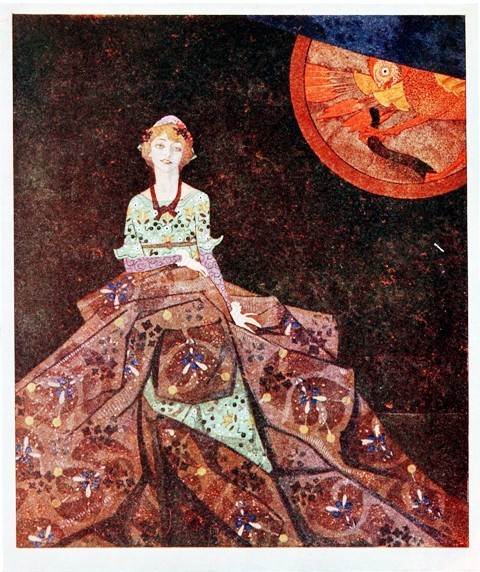 FRITILLA AND THE RED FLYING-FISH
FRITILLA AND THE RED FLYING-FISH
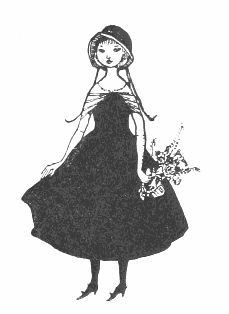
ILLUSTRATED BY THE
AUTHOR AND RETOLD
IN ENGLISH BY
F. TENNYSON JESSE
NEW YORK: DODD, MEAD AND COMPANY
LONDON: WILLIAM HEINEMANN
1920
Printed in Great Britain
PAGE
CHAPTER I
Smaly and his wife Redy set forth in search of three little girls:
They are bewitched so that their noses turn into beaks: Smaly
eats the latch of a door and Redy eats the hinge: Redy's fingers
weep tears: They meet with a Confectioner who resembles a
Kangaroo 1
CHAPTER II
Smaly installs himself upon one of the Kangaroo's paws: The
two little people see some of the inhabitants of this peculiar
country: They meet some sugar horses, and they see also a fish
which flies and some sponges which walk: The Wigs imagine
that Smaly is made of suet: The ebony and crystal spectacles:
The Mother of the Crow 15
CHAPTER III
The Short-Legged Man with the musical voice: Smaly and
Redy again declare they are travelling to find three little girls:
Papylick puts Smaly and Redy in two boats made out of nutshells
34
CHAPTER IV
Smaly and Redy are not well received: They are thought to be
made of painted cardboard: How the Despoiler fell into the
water and left a foot behind him: Mistigris sticks a fish-bone
into the back of the Despoiler: Judgment is passed on the two
strangers: They will be banished at nightfall: The walls of
the three gardens are discussed 38
CHAPTER V
Redy and Smaly watch the review of the troops: Smaly and the
Mother of the Crow discourse about soldiers: The Chief Contractor
distributes the food, and the Wigs pass through a curious
[Pg vi]little door: The Soy powder makes the provisions grow 59
CHAPTER VI
The Sugar-Cane Prison arrives: The Rats water it with Soy
fluid to keep the canes growing as fast as the Prisoner breaks
them down: The time for siesta draws on, and Smaly and Redy
go into the house of the Historian 73
CHAPTER VII
The Flying-Fish announces the hour of three, and the World
falls asleep: The Hen makes six hard-boiled eggs: Smaly and
Redy begin to read the manuscript of the Historian 82
CHAPTER VIII
Redy and Smaly read of the childhood of the Prisoner 95
CHAPTER IX
The elder Flying-Fish loses one eye, and the Hen finds it:
The Historian wakes up, and Smaly and Redy run out of the
house: The Healer mends the paw of the Confectioner 100
CHAPTER X
The Wigs all imagine they suffer from headache: The Rats come
to the Healer to be cured of the ravages of hot Soy: The Chief
Contractor has to make himself ill eating the musical instruments 111
CHAPTER XI
The young girls dance for the Rats, then play a curious game
of tennis: They fail to understand Smaly's point of view 122
CHAPTER XII
The Mother of the Crow tells of the life and death of Djorak
in his own country 127
CHAPTER XIII
Smaly and Redy are taken to see the Fleet: The Prisoner arrives
and the Wigs fly in terror: Smaly and Redy at last have speech
with the Prisoner 146
CHAPTER XIV
The three daughters of the Prisoner are installed in their gardens 161
CHAPTER XV
Smaly and Redy effect the rescue of the three young girls:
Djorak joins them and they all partake of a delightful picnic:
Smaly blows the Soy powder over the country of the Wigs:
Then the six friends go home 170
[Pg vii]
Facing page
Fritilla and the Red Flying-Fish Frontispiece
The City Curious 16
They were known as the "Wigs" because of their Large Perukes 24
These Creatures did not resemble Anything that Redy and Smaly had seen up to then 32
Laptitza and Papylick 64
Some of the Dances were very complicated 96
Kisika in her Sedan-Chair 128
The Picnic which followed was an Unforgettable Repast 160
PAGE
Redy 2
Smaly 3
In this Land all the Birds wore Hats and Spurs 4
Redy's Hands were crying with Fright 6
But he found he, too, had a Beak 7
They sang and danced 8
[Pg viii]Neither the Latch nor the Hinge bore any Trace of having been bitten 10
Looking for the Key 11
Kangaroo-Confectioner 13
To carry the Last Curl as though it were the End of a Train 16
They made one want to Dance 17
With the Spoon which every Wig carries hung from his Belt 19
These Horses, however, were made of Sugar 20
The Sponges 21
To return to a Mere Shapeless Thing once again 23
A Traveller told us 24
Nevertheless Smaly and Redy started to help him 26
The Grub was really the doorkeeper 27
"We wish to have three girls" 28
The Crow lifted him up 29
The Crow 30
The Mother of the Crow 31
"She sees only one side of men, birds, and things" 32
The Short-Legged Man 35
Papylick 36
Opening the Nuts and displaying the Two Little People 39
Leading by the Hand the Chocolate Grub 40
The Birds with their Legs encased in Cutlet Frills 41
The Eggs running along 42
They were Gentle and Pretty Pigs 43
A Most Splendid Feast 44
The Despoiler 45
Which is in this Country a Great Sign of Mirth 46
He fled hastily 47
Mistigris 48
The Young Stork 49
[Pg ix]Every One uttered Cries of Indignation 50
"You can roll the cord" 51
The Chief Contractor replied 53
Children were built of much fewer Slices of Cake than the Grown-ups 54
These Creatures will eat the Top off the Walls 55
Anger 56
It seemed to them that Men grew upwards and not towards the Ground 57
Some very Elegant Mice 58
One Half expressed Severe Authority, the Other was All Gentleness 60
He decided that they must have a Similar Review every Week 62
They had all put on Thick Gloves 63
Wigs, who were putting the Soldiers back in their Boxes 64
President of the Republic of Pasenipus 65
To conduct her Back to her House, which was in a Cosy Nook
in a Great Tree of Coral 67
The Confectioner 69
"Nevertheless it's so narrow that only one person can go
through at a time" 70
The Song went on 71
Running hard with their Little Short Legs 73
Soy Mill 74
Soy Reservoir 75
Carrying away every Object that they could lift 77
The Prisoner 79
The Prisoner never ceased to break the Sugar-canes 80
The Pet Flying-Fish, which every Wig Family possesses and cherishes 83
The Amount of Cake and Pudding eaten Annually in the Country 84
[Pg x]The Elder of the Fishes 85
The Hen 86
This Care which the Confectioner took of Fritilla was by
no Means unnecessary 88
The Smaller Flying-Fish 89
Dropped them through a Hole in his Beak 90
Was sitting with One Ankle across the Knee of his Other Leg 91
The Despoiler, who was always afraid that Some One would
find out that he was only made of
Cardboard, never
slept in Public 93
"Instead of cutting his toe-nails as we do with the help of
a long-handled
pair of scissors and a telescope" 96
The King 97
The King's Daughter 98
The Healer 103
Born with the Idea of One Day being a very Big Man 104
Between them was fastened a Comfortable Arm-chair 106
There were Newsboys selling Accounts of the Latest Disaster
to the Wigs 108
The Healer had finished his Mending 109
Mathematician 111
Migraine 112
Wrapped their Handkerchiefs round their Heads 112
"I, too, hope so," said his Wife, who had just come in 113
Nearly all had One Leg which was much Longer than the
Other, or a very Long Arm 115
His Elongated Tail was tied to the Queue of his Wig 116
"But only look at our arms and legs" 117
Even more than they feared the Flies 118
Rewards 119
The Dwarf had pulled on a Pair of Boots 120
[Pg xi]The Accordion-Players began 123
Tennis 124
The Ball hung up thus 125
Tea-Cosy 128
"We're waiting for the sun to go down" 129
Servants out Shopping followed it with their Laden Baskets
on their Arms 131
He thrust his Face into Roses covered with Dew 132
The Executioner bandaged his Eyes 133
Next he took some Old Cardboard Boxes 135
Opened them and shut them again 136
His Young Son was there 137
The Brindled Rabbit 138
His Little Paw shoved a Folded Slip of Paper through the
Opening 139
Then they sang a Comic Duet 140
Then they questioned a Black Toad 141
And fish in the Little River in the Afternoon 142
The Thin Long Arm of the Historian 143
Extracting Fish-bones from the Back of the Despoiler 147
They bore a Large Copper Cauldron 148
The Admiral was a Triton 149
The White Dolphin with Pink Eyes 150
An Extremely Curious Fish 151
"A band of our rats will each morning copiously water our
fleet" 153
Wigs were busy writing their Names 154
A Red Flag 155
"I have destroyed a hundred times passing over it in my
prison" 157
"I was caught stepping right over their silly old dry canal
[Pg xii]with one stride" 158
The Manufacturer of Cardboard Boxes 159
A Sentinel who looked like a Dragon-Fly 163
The Gardens were arranged after the Same Principle as the
Windows in the House of the Historian 164
A Little Red Feather, which she had picked up in the Market-Place 166
Next the Despoiler approached 167
The Wife of the Chief Contractor presented Kisika with a
Beautiful Fan made of Paper Lace 169
Directly they saw the Flying-Fish enter 171
Their Two Little Heads appeared Side by Side 172
Smaly standing on the Point of his Toes 173
So during Three Days the Young Girls were busy making the
Stairs 175
The Red Flying-Fish carried a Large Hat and Mantle in its
Claws 176
Carrying as many of the Presents as they could 177
Wigs themselves would have melted away directly they
passed the Frontier 178
They hung out of the Windows 179
Smaly and his wife Redy set forth in search of three little girls: They are bewitched so that their noses turn into beaks: Smaly eats the latch of a door and Redy eats the hinge: Redy's fingers weep tears: They meet with a Confectioner who resembles a Kangaroo.
Smaly and Redy were husband and wife, and they lived together in a little white house. This house had three rooms upstairs and three rooms downstairs; and each room was so pretty that it gave one joy to see it. Smaly and Redy were very proud of their house, and were never so happy as when they were putting it to rights. Every day they did something to one or other of the rooms, changing the position of the furniture or the pictures.
One day, while Smaly was walking in the town he saw three mirrors in a shop window, and he thought they would be just the thing to hang up in the three bedrooms; so he bought the mirrors and went home with them in high glee.
In the meantime, Redy, his little wife, also had an idea to beautify the bedrooms, so she went out into the garden to pick some flowers.
Smaly hung a looking-glass in each of the three little bedrooms, then he carefully closed all three doors and, going downstairs, sat himself by the[Pg 2] hearth. A fire was burning there, for the spring was still young in the land.
While he sat there, smoking, lost in the most delicious daydreams, his pleasant little wife Redy came in with her arms full of flowers. She took three vases from the dresser, and began to arrange the flowers in them, holding her head on one side like a bird.
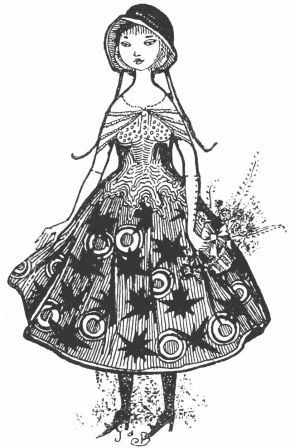 Redy
Redy
When she had put each flower exactly as she wished, she gently shook Smaly's elbow. He jumped up, took two vases without a word, while she picked up the third. They disposed a vase in each of the three little bedrooms, and stood back to admire the effect; which, indeed, was quite charming.
Suddenly Redy gave a sigh.
"It's all very well," said she, "but there's no one to live in our pretty rooms."
Smaly sighed, too. "That's just what I was thinking," said he. "Oh, Redy, how nice it would be if we had three little girls to live in our three bedrooms, so that they could admire your flowers and look at themselves in my pretty mirrors."
"Let us wish for them," said Redy, and she folded her hands together on her apron and chanted:[Pg 3]
Smaly repeated the poem in his turn, but Redy had to prompt him, for he had a very bad memory.
They waited for some time, but nothing happened, so they said the verse over again, and this time Smaly repeated it without any mistake; but still nothing happened.
"Wishing does not seem to be much good," said Smaly despondently.
"Wishing never is any good," answered Redy, "unless one does something more than wish. If we want to find our three little girls we must set out and look for them."
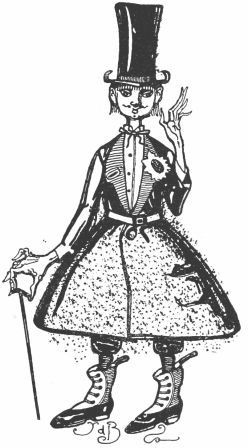 Smaly
Smaly
"Yes, but where?" asked Smaly.
"As for that," answered his little wife, "I do not know any more than you, but that verse we chanted just now is a magic verse, and we shall find the way. We will get ready to start to-morrow."
So the very next morning they set off on their search for the three girls who would fill the white house with joy.
Redy had dressed herself in her best. Her green gown[Pg 4] was trimmed with black and emerald leaves, and her stockings and little cocked hat were green to match. In her basket she thoughtfully placed two apples.
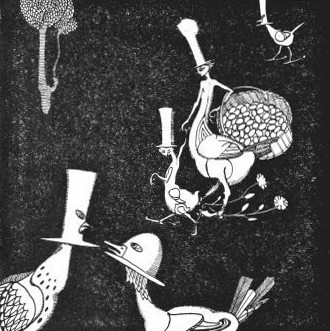 In this Land all the Birds wore Hats and Spurs
In this Land all the Birds wore Hats and Spurs
Smaly faced the world in his beautiful dark violet coat, on his head a tall hat of the same colour. A belt of yellow leather clasped his waist. In his buttonhole he stuck a sunflower to show how happy[Pg 5] he was. His best boots shone upon his feet. In the big pocket of his coat he placed a couple of fresh rolls. The rolls and the apples were their provisions for the journey. For weapon, in case of attack, Smaly carried a thin red stick.
For a long while they walked and walked. They crossed many countries which everybody knows. At last, however, they found themselves in a strange land, a land of which one hardly ever even hears—a land which was even odder than these two odd little people.
In this land both men and beasts lived upon nothing but sweetmeats and pastry.
In this land the sun shone longer than it does with us, because it often stopped for a while to rest during the course of the day.
In this land all the birds wore hats and spurs.
In this land an orchestra of swallows played always at noonday.
In this land earthworms wore spectacles on their noses and swords at their sides.
In this land such things as bricks, iron, wood, stone, and steel were unknown.
In this land, after one had finished dinner, one ate the plates and dishes, for they were made of sugar.
In this land nearly every inhabitant was made of slices of cake, held together with pudding, sweetmeats, nougat, and chocolate.
In a word, there were to be found in this curious[Pg 6] country a great many things that were strange and wonderful and good to eat.
Smaly and Redy knocked at the door of this wonderful land, but for some time no one came to answer them.
"Bother this door!" said Smaly, at last, kicking at it with his new boots, and hitting it with his red cane.
"Why, it's made of chocolate!" cried Redy, who had sucked her fingers after touching it.
"I will eat the latch away!" decided Smaly.
"And I'll eat the hinges," said Redy.
She seized a hinge and he tore off the latch.
The next moment the tears were pouring down their faces.
"Oh, oh, it's burning me!" cried poor Redy.
"It must be made of red pepper and spice!" wept Smaly.
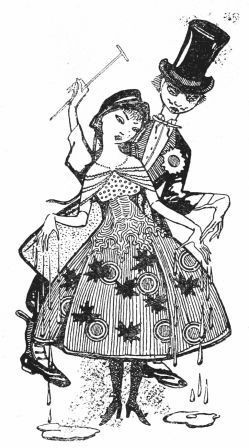 Redy's Hands were crying with Fright
Redy's Hands were crying with Fright
They had certainly burnt their tongues. They held hands and ran away, uttering little moans of pain. The path took an abrupt turn, then another, then a[Pg 7] third, and yet a fourth, till it had described a complete circle. Smaly and Redy found themselves once again opposite the door.
There was no longer any way out, for a thick hedge now surrounded the two travellers, and they found themselves in a sort of green arena. Quite a pretty arena, but all the same, it was rather alarming to find themselves there, without a word of warning.
And the thick green hedge around the arena grew with such a horrible rapidity. Very soon it was so high that the place became as dark as night.
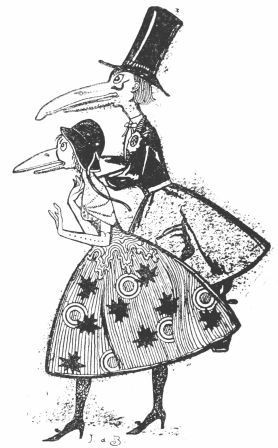 But he found he, too, had a Beak
But he found he, too, had a Beak
Smaly, in his alarm, had seized both Redy's hands in his, and now he suddenly noticed that they were all wet. For one dreadful moment Smaly thought they must be wet with blood, but the fact was that poor Redy's hands were crying with fright.
For a little while Smaly and Redy wept bitterly, but they soon grew too tired to cry. They shut their mouths firmly, and tried to leave off sobbing when they left off weeping, but their sobs kept on and on in spite of them, for[Pg 8] all the world like a tap that keeps on going "glug-glug!" when one has forgotten to turn it off.
Smaly put up his hand, meaning to lay it gently over Redy's mouth.
She no longer had a mouth—in place of it was a fine large beak, painted an elegant blue. Filled with horror, and sure that their end had come, Smaly thought to print on Redy's cheek one last kiss of despair.
But he found he, too, had a beak, with which he could do nothing but peck. They stood staring at each other's beaks. They did not yet know that the beaks were invisible to all save themselves and the birds.
They sat down on their heels like Turkish princes, and their sobs went on and on, sounding like the lament of thousands of insects, and still the green hedges around them went on growing, till it seemed that the two poor little people were at the bottom of a profound green funnel, brimming with darkness, in which their moaning sounded like the wind in the chimney of a winter's night.
"Oh, oh, my Redy, we're in a pretty pass!" murmured Smaly, and Redy knew that he was feeling almost mad with fright, so that at once she felt mad with fright also. Now Redy had heard that mad people sing and dance, and so she at once began to do both, dragging Smaly along with her. They sang and danced till they had no breath left, and then they wanted to drop down and rest, but[Pg 9] found they had to keep on and on in spite of themselves. The dance of terror, and the song with which their little little sobs and moans mingled, continued there at the bottom of the green funnel. There was more noise than there is at midday in Oxford Circus.
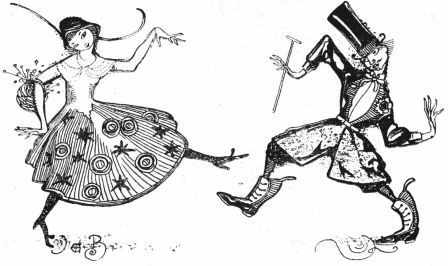 They sang and danced
They sang and danced
The pepper from the latch of the door began to burn again in Smaly's mouth, and reminded him that after all there was a door out of this horrible place. He began to feel about for it in the darkness. When he found it he uttered a sharp little cry, which, like the moans and the singing, refused to die away, but went on echoing in the green funnel, so that by now there was a noise like a tempest, for all the world as though the whole sea had been imprisoned in a box—and a box too small for it.
Smaly uttered this cry because he had discovered[Pg 10] that the latch was once more in its place on the door, although Smaly had thrown it far away after biting it. Redy's hinge also was back in its place. Neither the latch nor the hinge bore any trace of having been bitten, but felt smooth and solid to the fingers.
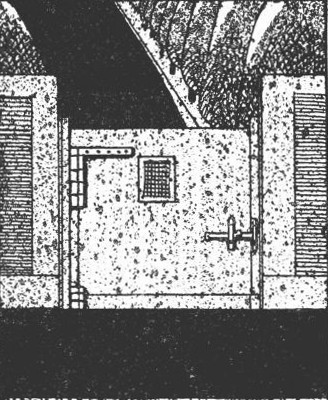 Neither the Latch nor the Hinge bore any trace of having
been bitten
Neither the Latch nor the Hinge bore any trace of having
been bitten
Smaly and Redy became even more terrified than before, so that their hearts felt like two little lumps of ice in their breasts. And then a very odd thing happened to them. Their beaks opened of themselves, and these words came out of them—words which Smaly and Redy had never thought of saying:[Pg 11]
"Where is the key?"
Nothing answered them.
Then they found themselves on their hands and knees looking for the key.
"Where is the key? Oh, Reckybecky, where is the key?" the beaks demanded, entirely of their own accord.
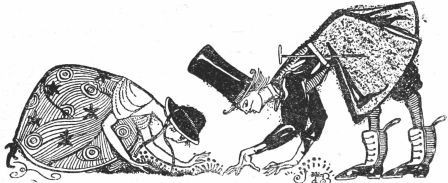 Looking for the Key
Looking for the Key
Immediately a little grille opened in the door, and a voice said:
"Upon this side are honey, tea, and sugar! On your side are pepper, ginger, and allspice!"
"And on this side there are also the beaks of birds!" replied Smaly, alarmed at his own temerity; "and here also are the hands which weep! And the horrible moanings! And——"
He was interrupted by a gentle laugh. This laugh sounded like a little peal of crystal bells. And as the laugh went rippling on, the hedge began to shrink and shrink, and the moans and sobs died away.
The hearts of Smaly and Redy were beating like a couple of alarum-clocks. The gate had a little grille in it and they peeped through this grille to see what creature it was whose silvery laughter had the power to charm away both the high hedge and the weird moanings. Although the creature was several yards away they could see quite clearly his large, rosy eyes edged with grey rims. They saw the creature as distinctly as one can see the actors on the stage when one looks through opera-glasses.
They saw that the rosy grey-rimmed eyes were set in a face of the green of a pistachio-nut. The hair was the vague blue of cigarette smoke. The head looked as though it were sculptured out of mother-of-pearl. Later, they discovered that it was a mingling of ice-cream and jelly, for the creature himself was a confectioner.
He was a confectioner ... and yet Smaly could have wagered his beautiful new boots that he was more of a kangaroo than anything else. For though this confectioner wore an apron and a fine green waistcoat, yet undoubtedly his chess-board trousers and embroidered stockings covered the powerful hind legs of a kangaroo. The long paws were shod with a species of pattens, so big they seemed like miniature tables, and these pattens were painted scarlet. Slung all about him, the Kangaroo carried as many pots and pans as a travelling tinker. He was adorned as well by spoons of bamboo, and from his belt hung ebony-handled knives, while jam-jars and flagons, filled with preserves and essences, dangled[Pg 13] about him. The most tender mauves and translucent greens glowed through the glass of the flagons.
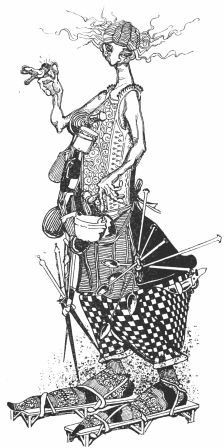 Kangaroo-Confectioner
Kangaroo-Confectioner
Smaly studied the good-natured face of this personage, and asked him simply:
"Who are you?"
Then the Kangaroo-Confectioner said a surprising thing. He replied:
"I am the Architect."
The moment he had spoken he put up his hand and shut his mouth, to prevent the sound of his words going on and on in the curious air of the place, which seemed to hold sounds suspended as water holds the fronds of weeds.
Smaly looked at him dubiously.
"You say you are an architect ...[Pg 14] and yet your occupation appears to me to be much more that of a confectioner, a super-confectioner."
The Kangaroo seemed overcome with a nervousness; his smiling face creased itself into a thousand little lines of distress, his eyes looked vacant, his manner became flustered. Evidently he was struggling with his emotion. When he had sufficiently recovered he planted his long feet more firmly on their scarlet pattens, and, taking a deep breath, chanted as follows:
But, since the word "allspice" continued to reverberate through the air, the Confectioner shut his mouth smartly with his finger and thumb.
Smaly installs himself upon one of the Kangaroo's paws: The two little people see some of the inhabitants of this peculiar country: They meet some sugar horses, and they see also a fish which flies and some sponges which walk: The Wigs imagine that Smaly is made of suet: The ebony and crystal spectacles: The Mother of the Crow.
Smaly saw that there was no reason to be afraid of this strange creature so he crawled in through the grille of the gate and sat down upon one of the Confectioner's enormous paws. Redy made haste to follow him. No sooner was she settled than a number of strange little beings appeared as though from nowhere and clustered around her, pointing curious fingers at her while they chatted amongst themselves.
These little beings were the inhabitants of this strange new country. They nearly all wore gigantic wigs, and sometimes these wigs were so long that they needed a page to carry the last curl as though it were the end of a train.
The more Redy looked at these funny little people the greater was the amazement that appeared upon her face.
Smaly also was astonished; but he would have died sooner than let his astonishment appear.[Pg 16]
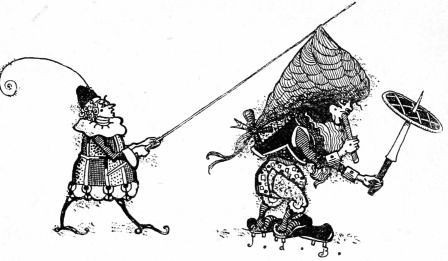 To carry the Last Curl as though it were the End of a
Train
To carry the Last Curl as though it were the End of a
Train
These curious little beings, who were known as the "Wigs" because of their large perukes, were even smaller than Redy and Smaly. At first sight they looked rather like those stiff little coloured figures you may see in Egyptian drawings at the British Museum, but no Egyptians were ever dressed as these people were. Their vividly coloured clothes were composed of mosaics of caramel and jam, with insertions of fruit and cake. Each one wore on his head a hat made of preserved fruit or of a whole bun or little cake. Shoes seemed to be very much a matter of individual taste in this land, for every inhabitant wore a pair of a different colour, shoes so gay that the mere sight of them made one want to dance. There was one woman in particular who wore upon her head a cake in the form of a little tower, who had the most charming mauve shoes with red soles, upon which Redy felt her eyes always returning enviously.
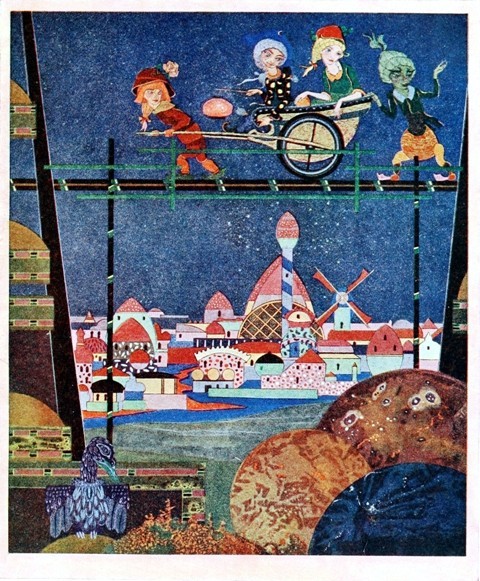 THE CITY CURIOUS
THE CITY CURIOUS
The Wigs for their part had not gathered together merely to look at the little strangers. With brightly coloured sponges some began to mop up the dew which still clung to the leaves of the hedge, while others with little pieces of blotting-paper set to work to dry each blade of grass at the side of the road. This seemed such a useless thing to do that Smaly would have liked to ask why they were doing it, but he felt too shy, so he contented himself with winking at Redy. Then he glanced up at the Confectioner.
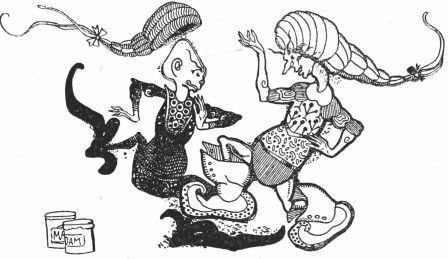 They made one want to Dance
They made one want to Dance
"Tell me—why has Redy got a beak?" he asked, and before he could be answered began to suck his finger. He sucked it because a drop of[Pg 18] sweet preserve had fallen upon it from one of the Confectioner's pots.
"Has Redy got wings as well?" asked the Confectioner, thoughtfully taking a spoonful of the same preserve and offering it to Redy.
"No," said Smaly.
"Then she can't have a beak," replied the Confectioner triumphantly.
"Do you mean to say you don't see her beak or mine either?" asked Smaly in astonishment.
"Never in my life have I seen a beak upon any creature that had not wings as well," replied the Confectioner stolidly; "therefore it doesn't exist."
"A beak, a beak, a beak, not exist, not exist, not exist," said all the echoes one after the other.
Smaly decided to wait until the Confectioner spoke again; but it was Redy who broke the silence in an unexpected manner.
She walked away from the Confectioner and stood looking at him scornfully from a little distance.
"An architect!" she said. "You say you are an architect, but when we called 'Reckybecky' you opened the door, therefore you are Reckybecky, nothing but Reckybecky."
The Confectioner, who was a simple soul, stared at her very disconcerted. "Reckybecky," he repeated in a sort of stupefaction. "Reckybecky, am I really nothing but that?"
"You are Reckybecky," repeated Redy firmly.
"Dear me, I never heard that before," said the Confectioner. "I wonder if you can be right.[Pg 19] Then if I am Reckybecky I suppose I am not an architect at all," and he covered his face to try and think more clearly.
The two little people watched him timidly, wondering what was going on in that bent head. Suddenly the Confectioner raised his head and flung his pots and pans, his spoons and his knives, on to the ground on either side of him.
Most of the pots broke and fragrant streams of beautifully coloured preserves spread here and there over the uneven ground. Immediately dozens of Wigs pounced upon the wreckage, and while the jams trickled hither and thither amongst the grass these creatures tried to scrape it up again into jugs and basins, and even into their caps, with the spoon which every Wig carries hung from his belt.
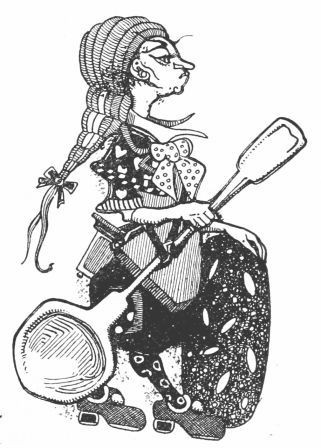 With the Spoon which every Wig carries hung from his
Belt
With the Spoon which every Wig carries hung from his
Belt
At some distance off a procession had been passing which had hitherto paid no attention to the crowd round the gate, but now this broke up and various persons quitted its ranks to try and scrape up some of the precious preserves. These creatures did not resemble anything that Redy and Smaly had seen up to then. At first sight they all appeared to be riding[Pg 20] little horses; horses draped like those which we see in old pictures of tournaments.
These horses, however, were made of sugar, and very soon Redy and Smaly perceived that they were simply worn round the waists of the Wigs, whose two feet ran along the ground beneath the draperies where the four feet of the horses should have been.
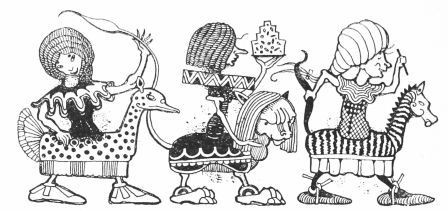 These Horses, however, were made of Sugar
These Horses, however, were made of Sugar
Smaly could not help thinking that to have a horse like that would be rather fine if you could not afford a real horse of your own; but Redy was occupied in admiring the fine costumes of the Wigs who owned the horses.
These cavaliers were splendidly clad in green, white, rose, grey, and black. One, in particular, wore rose-coloured boots, and his horse was made to resemble a blue roan. Its mane was like a cocks-comb, cut in scarlet points.
All these things Redy and Smaly managed to observe without showing undue astonishment; but[Pg 21] neither could resist a little cry of surprise when they saw flying through the air a large fish. This fish, who wore a ring through his nose, had also come to take part in the unexpected feast.
Finally, even the Sponges, which the Wigs carried in their hands, and with which they had been drying the hedges, jumped out of their hands. Each Sponge unfolded little legs and started running towards the jam.
And now a strange thing began to happen to the Confectioner. The poor fellow was evidently in great distress because Redy had told him that he was not an architect, but only Reckybecky.
Redy and Smaly had never in all their lives seen any one so cruelly upset.
He seemed to be melting before their eyes and becoming transparent. He did not cry; but seemed rather to be transformed into a sort of damp and clinging fog. "Just as though he were 'dissolving in tears,'" thought Smaly. And he stared curiously at the Confectioner who every moment became more cloud-like than ever.
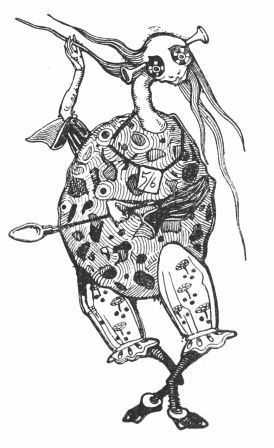 The Sponges
The Sponges
But suddenly the vague outline of a hand, which was all that remained[Pg 22] of him, struck the vaguer outline of his forehead as though an idea had come to him. Once more his face assumed a clarity as though it were made of mother-of-pearl, and he cried out:
"Reckybecky!"
This name reverberated round and about like a clap of thunder. It went on and on, making such a noise that all the little Wigs left off scraping up the jam and scampered away.
Redy felt afraid. Smaly jumped off the patten on which he had remained perched during the eclipse of the Confectioner. As to the latter, he endeavoured to shut his mouth and stop the noise from going on echoing; but he was not very solid again as yet and found some difficulty in doing it. At the end of the long avenue of sugar-trees Redy could see little groups of people gathered together looking about them to try and discover whence came this noise.
The Confectioner succeeded in shutting his mouth, and then turning towards Redy he opened it again, and remarked firmly:
"You are a stupid little thing."
Then turning to Smaly he said, with that confidential accent which one adopts when singling out the most intelligent person of a company for one's remarks:
"No, I cannot be Reckybecky, for somebody else is Reckybecky, so there!"
The Confectioner seemed extremely relieved by this remarkable solution.[Pg 23]
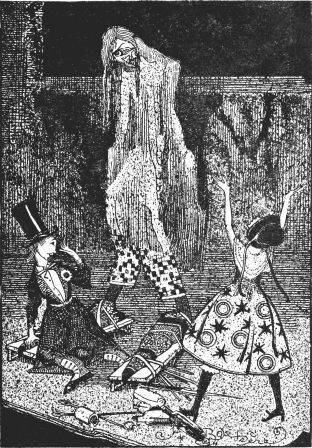 To return to a Mere Shapeless Thing once again
To return to a Mere Shapeless Thing once again
"Reckybecky must be the doorkeeper," he added firmly.
"The doorkeeper?" asked Smaly and Redy.
"Certainly, we've had a doorkeeper for years, and one day a traveller told us that since we had a doorkeeper it was necessary we should have a door, and then the Despoiler, who is the wisest of all of us, except the Mother of the Crow, decided that since we had a porter who was made of chocolate, we must have a gate made for him, and that the gate should be made of chocolate to match."
Smaly and Redy turned to look back at the door; the grille by which they had entered had disappeared, and everywhere the chocolate had become solid once again.
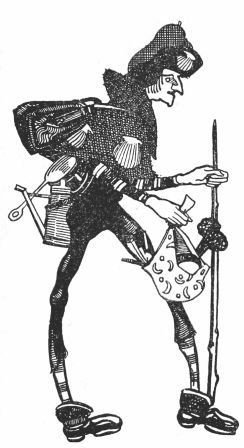 A Traveller told us
A Traveller told us
"I will show you the doorkeeper soon," promised the Confectioner, "but for goodness' sake don't tell him that you know he's a doorkeeper. He thinks he's simply a chocolate grub on his way to become a chocolate butterfly; in fact, we have nominated another doorkeeper to take his place if this ever comes off. This other person isn't really a doorkeeper either, but there's one thing he can do, and that is, he can make the latch and the hinge grow again when somebody has eaten them." The Confectioner looked at Redy and Smaly very severely when he said this.
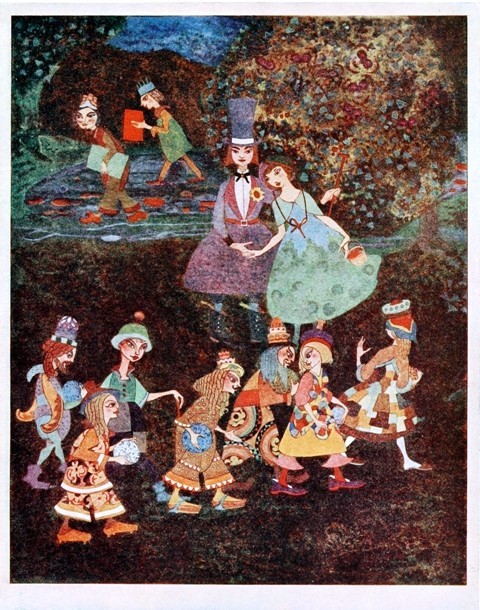 THEY WERE KNOWN AS THE "WIGS" BECAUSE OF THEIR LARGE
PERUKES
THEY WERE KNOWN AS THE "WIGS" BECAUSE OF THEIR LARGE
PERUKESThey both felt extremely embarrassed.
With his nail, which looked exactly like a horn salt-spoon, the Confectioner scraped the inner side of the door just beside the latch, and Redy and Smaly saw the chocolate grow again as rapidly as he scraped it away.
The Confectioner gave a little exclamation of annoyance, and began to hunt for his magic ring amongst all the things he had thrown to the ground; but he could not find it. This ring had the power of preventing both plants and things from growing, and without it the Confectioner was unable to prevent the chocolate door from replacing itself as fast as he scraped it away. Nevertheless Smaly and Redy started to help him, and they all three scraped so hard that they caught a glimpse in the interior of the door of a tiny creature sitting in a niche. This creature was a grub about the size of a nut. Round its waist it wore a key as big as itself, and on its head a fur bonnet, which nodded forward to its chest.
"It's asleep," said the little man to the little woman.
At this moment a Crow made of bilberry preserve[Pg 26] and liquorice hopped up to them. This Crow was the doorkeeper who was yet not the doorkeeper; and who had been nominated in the place of the grub. The grub was really the doorkeeper; but always refused to admit it.
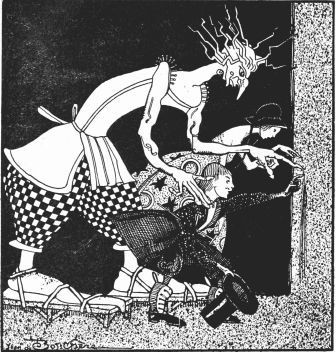 Nevertheless Smaly and Redy started to help him
Nevertheless Smaly and Redy started to help him
The Crow, who seemed convulsed with rage,[Pg 27] seized Redy in one claw and Smaly in the other, preparatory to throwing them outside once more.
At this dangerous moment Smaly once again found his beak crying out of itself. This time he heard it say that he wished to speak to the Chief Contractor.
The Crow lifted him up by his waistband, and gazed at him with his big bright eye like a magnifying-glass, then he dropped him.
"Why, it's made of suet!" he cried in disgust.
He turned his eye upon Redy, who appeared to him much better looking with her delicate little blue beak, which had a bloom on it like a grape. Unlike the Confectioner, the Crow was perfectly well able to perceive the beaks of Smaly and Redy, for he himself was a bird, and to no one save a bird or each other were their beaks visible.
And that is why you who are reading this book, and who are not birds, cannot see their beaks either, unless you make a great effort.
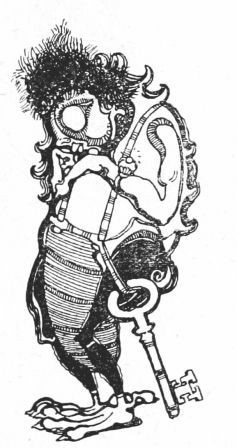 The Grub was really the Doorkeeper
The Grub was really the Doorkeeper
Redy, who saw that the moment had come to explain what they wanted, folded her hands on her apron, and repeated her little poem:
The Crow said:[Pg 28]
"It won't do," and he took off his glasses, which were made of ebony, set in a crystal frame. On the rims signs and letters were engraved in characters that looked rather Eastern. If you examined carefully you saw that round one lens was engraved:
And on the other one:
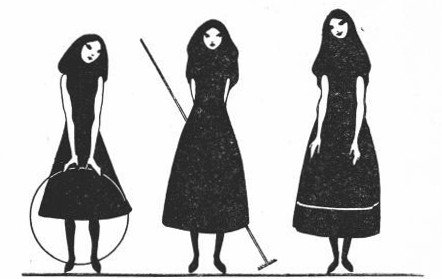 "We wish to have three girls"
"We wish to have three girls"
Smaly paid no attention to the spectacles, but answered the Crow's remark.
"Why won't it do?" he asked.
The Crow opened his beak to answer, then he shut it again, and put on his glasses, for he only wore them when he wanted to speak, and did not particularly wish to see.[Pg 29]
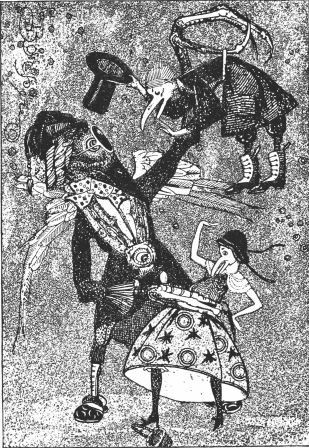 The Crow lifted him up
The Crow lifted him up
For this Crow had three eyes, one on each side of his beak, and a third one carried in a medallion which hung on a chain round his neck. This third eye was very busy and saw more than both the other two put together.
Redy felt extremely annoyed.
"How dare you look at me! You are only made of sugar and bilberry jam," she exclaimed.
"I didn't look at you," said the Crow, rather taken aback.
"Only because you are looking at me," now shouted Smaly.
"No, I am not," retorted the Crow, turning his back and taking off his spectacles.
"Don't leave us," cried Redy hastily. "I only meant that you were looking at us with that beautiful eye that hangs on a chain round your neck."
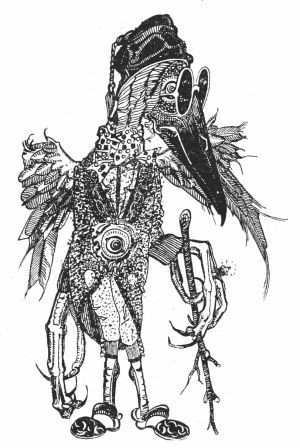 The Crow
The Crow
"Well," said the Crow, coming back and putting on his spectacles once more, "why didn't you say so at once? That's my mother's eye. She's[Pg 31] very old; but she still wants to know what is happening in the world, so I carry about her eye with me to let it see. But don't be frightened. She only sees you, she doesn't hear you."
"It wouldn't matter if she did. We should not dream of saying nasty things about your mother," said Redy with true emotion.
"I thought not," said the Crow more peaceably, "besides, she's such a funny little thing, poor dear; she's no legs, no wings, and no tail."
"Dear, dear, and only one eye?" asked Smaly.
"Yes," said the Crow, "only one eye, so she sees only one side of men, birds, and things."
"What does she live on?" asked Redy, with a woman's interest in practical matters.
The Crow replied, "Oh, on candy and caterpillars and sweets and flies, just as you and I do."
"I don't," said Smaly.
"Nor I," said Redy.
The Crow gazed at them with some disgust.
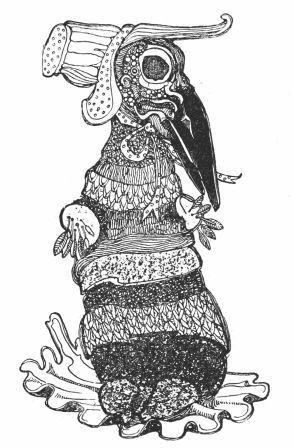 The Mother of the Crow
The Mother of the Crow
"No, I suppose you live on suet, mutton fat,[Pg 32] and oil," he replied, and once again turned his back.
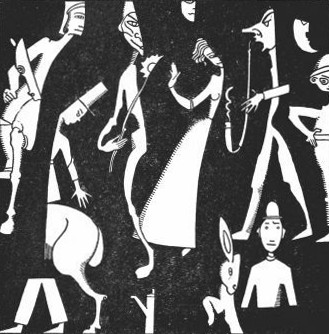 "She sees only one side of men, birds, and things"
"She sees only one side of men, birds, and things"
Again Redy tried to detain him; but this time the Crow said he must leave because he had something to write in his diary.
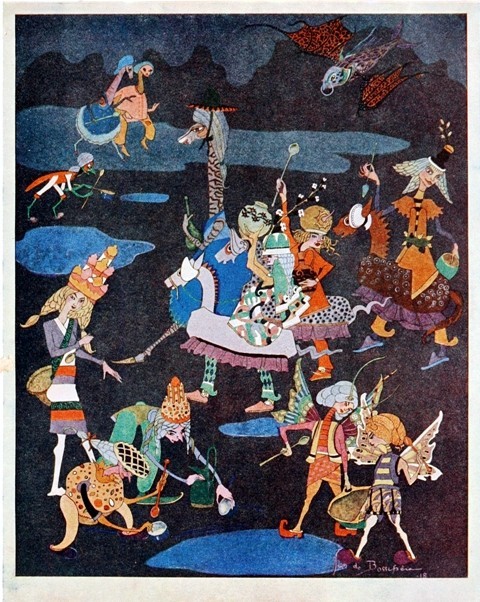 THESE CREATURES DID NOT RESEMBLE ANYTHING THAT REDY AND
SMALY HAD SEEN UP TO THEN
THESE CREATURES DID NOT RESEMBLE ANYTHING THAT REDY AND
SMALY HAD SEEN UP TO THENSmaly asked again why they could not have three sweet little girls.
Putting on his spectacles the Crow replied, "Because there aren't any."
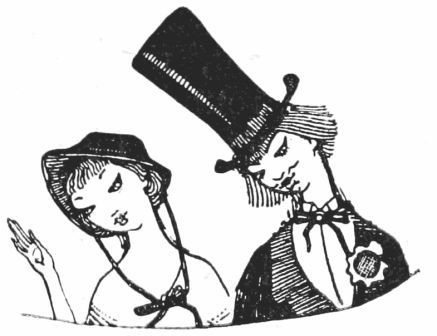
The Short-Legged Man with the musical voice: Smaly and Redy again declare they are travelling to find three little girls: Papylick puts Smaly and Redy in two boats made out of nutshells.
At this moment a short-legged little man came up to them, upon whose wig was perched a little round hat trimmed with a single rose. A box hung at his side, and upon this box was inscribed the word "SOY."
The Short-Legged Man had a voice so faint it was almost a whisper. It was as musical and delicate as a fiddle heard playing from a great distance. This little man whispered:
Smaly and Redy replied at once:
The Short-Legged Man said, "It won't do."[Pg 35]
"Why?" asked Redy.
"Because they should have three green, green, and rosy gardens."
"They shall have," said both the little man and his wife.
"It still won't do," said the Short-Legged Man.
"Why?"
"Because they can't leave this country."
There was a sad moment whilst Smaly and Redy thought of the little white house and the three bedrooms. Then they answered together:
"We'll make their gardens here."
"Come and talk to the Chief," said the Short-Legged Man.
But Redy was hungry and so tired she could not walk. The Crow, instead of helping, flew away. He hadn't really got to write anything in a diary, but he had to carry a girl called Fritilla to the tennis-ground, where a lot of young people were going to play tennis.
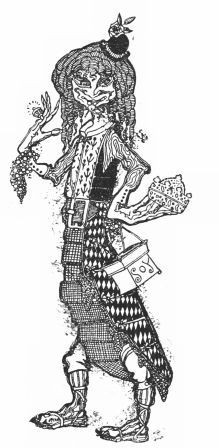 The Short-Legged Man
The Short-Legged Man
Fritilla was a pretty, fair girl with green eyes, whom the Crow had to look after. She was one of the three daughters of the Prisoner, of whom I will tell you later.[Pg 36]
But the Short-Legged Man took pity on Redy, and he shouted with his delicious voice out of his froglike mouth, "Papylick!" and this name was repeated as long as the Short-Legged Man did not put his spoonlike finger on his lips.
Papylick arrived with his name written on his boots, which were yellow as toffee, and had no laces. This Papylick was made of slices of different coloured cake, and he, too, carried a box with the word "SOY" inscribed upon it, a word which began to interest Smaly, though he was determined not to betray his interest.
Papylick had a nut in one hand, and opening it he put Redy inside and shut it up again.
Smaly, too, was tired, and thinking it much better for him also to be carried, he said:
"Papylick, my dear Papylick," and immediately shut his mouth again with the first finger of his left hand.
Papylick opened another nut and placed Smaly inside it, then the Short-Legged Man put both nuts in his pocket.
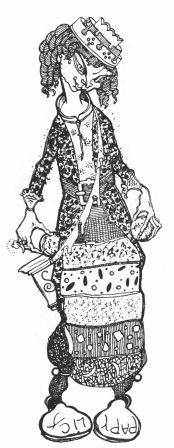 Papylick
Papylick
Now Smaly and Redy could not[Pg 37] see the country they were being carried through because the nuts were closed; but Papylick had thought of this, and so the landscapes were painted complete in every detail inside the nuts.
But Smaly and Redy, instead of admiring these landscapes, soon discovered they were painted with delicious sweetstuffs such as they had seen in the jars and pots of the Confectioner.
So they licked off the landscapes.
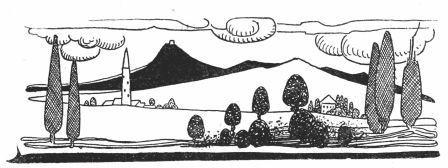
Smaly and Redy are not well received: They are thought to be made of painted cardboard: How the Despoiler fell into the water and left a foot behind him: Mistigris sticks a fish-bone into the back of the Despoiler: Judgment is passed on the two strangers: They will be banished at nightfall: The walls of the three gardens are discussed.
The two rulers of this country were the Chief Contractor and the Despoiler. On arriving at the town where the rulers lived, Redy and Smaly could hear a hundred bells ringing out crystal chimes. These bells were made of coloured sugar and were hung in campaniles of barley-sugar, whose domes were made of gilded crusts.
When the bells left off ringing, a beautiful song arose, and each person who sang it had a voice as sweet as that of the Short-Legged Man or of Papylick.
"We must have arrived for the midday prayer of the Wigs," said Smaly and Redy to themselves in their nuts.
Before very long Papylick and the Short-Legged Man arrived at the house where the Chief Contractor lived and went into the great kitchen.
"Well," said the Chief Contractor, coming forward to meet them, "what have you brought me?"[Pg 39]
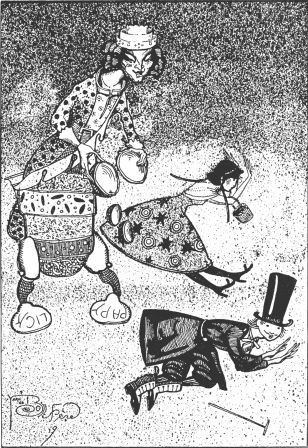 Opening the Nuts and displaying the Two Little People
Opening the Nuts and displaying the Two Little People
"A mere nothing," replied Papylick, opening the nuts and displaying the two little people, who, jumping out, became their normal size once more.
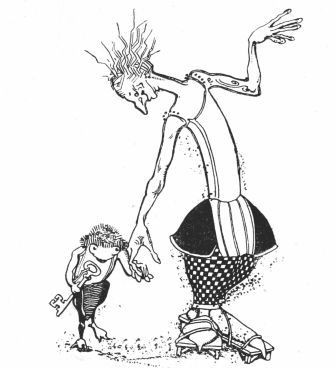 Leading by the Hand the Chocolate Grub
Leading by the Hand the Chocolate Grub
"They are two suet-eaters," said the Short-Legged Man apologetically, as he made Smaly and Redy sit down upon two charming seats made of painted wax.
There were more than a hundred of these seats round the enormous kitchen, each occupied by some noted Wig.
Smaly and Redy soon recognized the Crow, and[Pg 41] the next moment they saw the Confectioner come in, apparently having quite got over his trouble and leading by the hand the Chocolate Grub who was the doorkeeper.
The Chief Contractor and the Despoiler gazed attentively at Smaly and his wife; but as at this moment dinner was brought in, the two little humans were forgotten in the graver interest of the banquet. The eating in this country was a serious affair attended with many rites.
The banquet began. This solemn feast took place every day. As soon as the guests had taken their seats, each picked up a little slate, which hung by the side of his chair, a slate made of chocolate framed in well-cooked pastry, and each began to write his menu upon his slate. No matter what he wrote, whether it were eggs or roast larks, or whatever it were, the thing at once appeared: the birds with their legs encased in cutlet frills, and the eggs running along on two little feet, and carrying a spoon and salt-cellar in either hand.
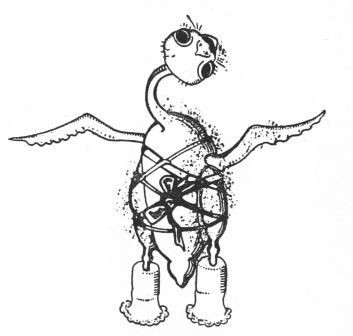 The Birds with their Legs encased in Cutlet Frills
The Birds with their Legs encased in Cutlet Frills
Redy and Smaly could not help thinking that all this was rather alarming; they were not used to seeing slices of toast arrive running like big spiders.
Careering busily about the kitchen[Pg 42] were little pigs made of marzipan. They were gentle and pretty pigs, who smelt deliciously of aromatic herbs, and each had a knife and fork stuck in his back.
When each guest had cut as much marzipan as he wanted he replaced the knife and fork, and the little pig at once ran merrily on to the next guest without turning so much as one of its marzipan hairs.
As to the tarts, they arrived flying like sparrows or miniature aeroplanes.
Redy also was presented with a slate, and she copied upon it the signs which she saw the Chief Contractor make upon his. By this means she partook of plum tart, oranges, and marzipan, all of which she shared with Smaly, who was not so quick as she was at copying the writing of the next-door neighbour.
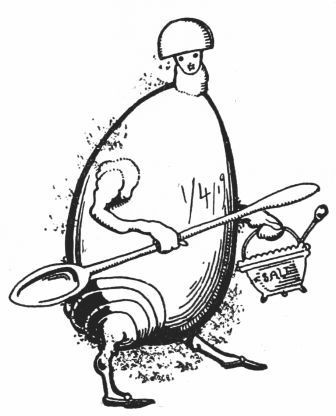 The Eggs running along
The Eggs running along
Certainly it was a most splendid feast; and as to the service, as one sees, it was conducted in a very novel fashion. Such was a banquet in this country, though on more ordinary occasions the Wigs had to go to their provisions instead of the provisions coming to them.
The feast over, the Wigs[Pg 43] dipped their hands in finger-bowls, which consisted of the halves of melons scooped out and filled with rose-water. The Wigs all appeared very happy, their cheeks were flushed, their little amethyst-coloured eyes shone with satisfaction, the air was filled with a delicious scent of fruit.
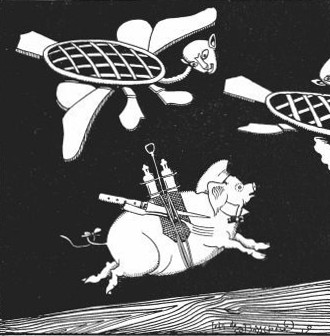 They were Gentle and Pretty Pigs
They were Gentle and Pretty Pigs
"It seems to me there is an extraordinary[Pg 44] smell of suet here," said the Chief Contractor, suddenly darting an unpleasant look at Smaly and his wife.
"For my part," said the Despoiler, whose whole person from his nose to his feet, which were flatter than pancakes, expressed extreme suspicion—"for my part, what I smell is painted and varnished cardboard." And he, too, fixed Smaly and Redy with his eyes.
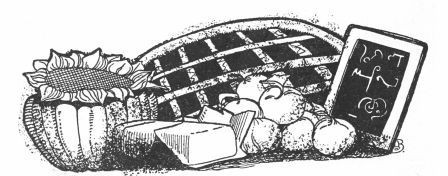 A Most Splendid Feast
A Most Splendid Feast
All the Wigs began to laugh, their large, amiable frogs' mouths expanded, and they crossed their fingers under their chins, which is in this country a great sign of mirth. They laughed because they all knew quite well that the Despoiler himself was only made of cardboard. He was certainly very well covered with jams and sweetmeats; but he was cardboard underneath for all that.[Pg 45]
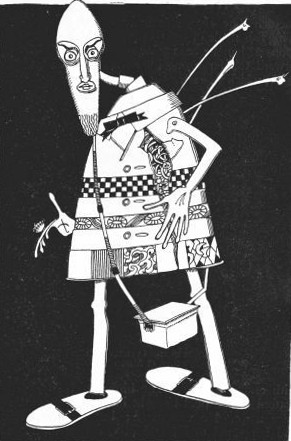 The Despoiler
The Despoiler
There was a story that one day the Despoiler had found himself beside a pool which lay between his house and the great kitchen of the Chief Contractor. The Despoiler had wanted to capture a flying-fish made of red marzipan, which was feeding upon a laurel-tree beside the pool. He leaned forward too far towards the tree and fell into the water, which was none the less wet for being scented with orange flowers. The birds which lived at the bottom of the pool brought him up to the surface once more. He was saved; but a terrible thing had happened to him. Not one spot of jam remained upon his cardboard.
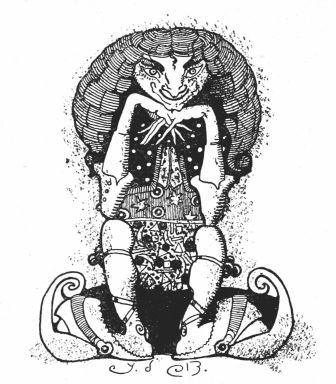 Which is in this Country a Great Sign of Mirth
Which is in this Country a Great Sign of Mirth
He fled hastily.
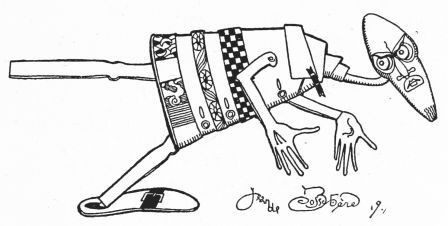 He fled hastily
He fled hastily
He had left one of his feet behind him in the water, and the Crow, taking off his spectacles, fished it up. Two kindly Wigs ran after the Despoiler with his cardboard foot.
The Despoiler, although he was very clever, was also very vain, and pretended that it was not his foot at all; but only the sole of one of his shoes; but all the Wigs knew perfectly well that it was really his foot.
While the Wigs were still laughing at the expense of the Despoiler, Smaly saw Mistigris, a Wig who moved with an extremely cat-like tread, strike the Despoiler from behind with a long fish-bone, and transfix his insensible cardboard back.
The Chief Contractor, who saw what had[Pg 48] happened, rattled the castanets which he wore on his left knee, and a young Stork dressed in the uniform of a fireman ran up behind the Despoiler, and by the aid of long pincers withdrew the fish-bone. This was evidently quite a usual occurrence.
The Chief Contractor picked up one of the masks that hung round his neck, a mask which was called "Dignity," and placed it over his face. When he had worn this for a minute he let it swing like a monocle, and put in its place a mask called "Severity."
"Let every one take his place," he cried in a stern voice.
The Wigs gathered round in a circle, all looking towards the door.
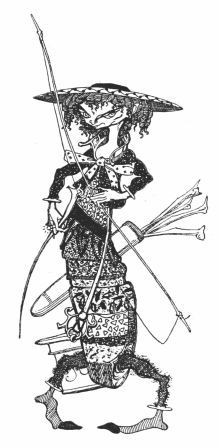 Mistigris
Mistigris
"You're making a mistake, old man," whispered the Despoiler familiarly. "The arrangement was that we were going to see a review of your soldiers."
"We are going to hold a council instead," shouted the Chief Contractor, and drops of perspiration, big and pink as strawberries, rolled down his mask.[Pg 49]
Suddenly he snatched it off and replaced it with a mask which signified "Anger."
The assembly trembled. There was a sound as of shuddering macaroni or of dominoes rattling with fear.
"Reckybecky, you are out of line!" cried the Chief Contractor from beneath his mask of saffron and flame colour. "Papylick and Mistigris, pay attention! Is it possible that already the intrusion here of two rascals made of suet is going to corrupt you all and reduce you to anarchy?"
Mistigris and Papylick came running up with a cord, and, each taking an end, they held it in front of the row of Wigs to keep them straight. Those Wigs whose feet stuck out too far drew them back, and those whose feet did not come out far enough advanced them until every one's toes touched the cord and made a straight line.
"You can roll the cord up," commanded the master; then he turned to Smaly. "Tell the truth," he demanded, "are you made of suet?"
At this moment Papylick and the Young Stork gave a cry of horror. They had discovered that Smaly and Redy had licked the painted landscapes off the insides of the nuts in which they had been transported.
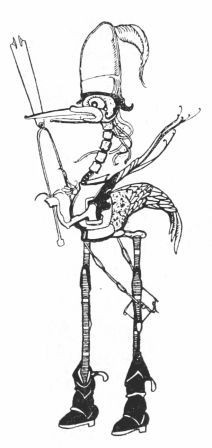 The Young Stork
The Young Stork
Every one uttered cries of indignation, and pressed forward so that their feet had to be brought to order again with the help of the cord.
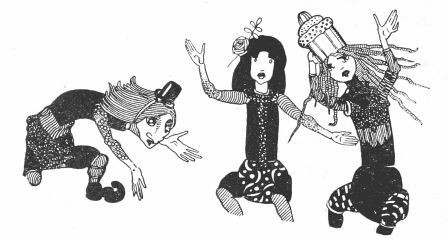 Every One uttered Cries of Indignation
Every One uttered Cries of Indignation
"The law is clear. These people made of cardboard and suet must be banished at once," said the Despoiler, who did not wear a mask, but could roll his eyes and open his mouth as much as he liked.
"The sun is at its height. It's hot enough to bake tarts," said the Confectioner. "If these two people go out now the sun will melt them, and our beautiful lawns will be covered with fat."
"Horror!" cried several of the Wigs.
"Then they must stay here until the sun has set," decided the Chief Contractor, and putting on a mask called "The Listener" he continued:[Pg 51]
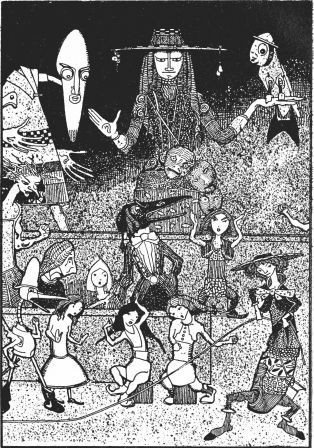 "You can roll the cord"
"You can roll the cord"
"Now tell me what they want, these disturbing people whom you have brought here. Tell me everything that you know, O Short-Legged Man."
But Smaly and Redy spoke together, and they said:
Here Redy stopped and said:
The Chief Contractor replied, "Won't do."
The Crow added, "Because there aren't any."
"There are the three daughters of the Prisoner," said the Chief Contractor; "but they can't go out of the country."
"Look here," said the Mother of the Crow, who had just been brought in seated in her oyster-shell, "why shouldn't this man and his wife live just behind the wall of the country, then they will be able to look at the Prisoner's daughters."
"That won't do," said the Chief Contractor, "the girls mustn't speak to each other. They don't know, none of them knows, that their father was beheaded, and if they spoke to each other about it they would all know."
"Well, well," said the Mother of the Crow, preparing to be very wise, "they can surround each garden by a wall and keep the girls separate."[Pg 53]
So it was decided that the little man and his wife were to be banished after sunset; but they could live beyond the wall, and the girls should each have a green garden surrounded by a wall of its own.
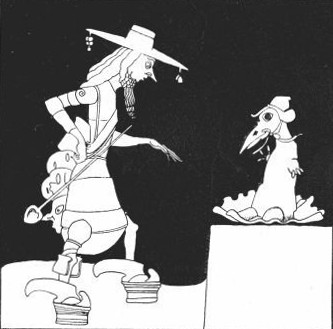 The Chief Contractor replied
The Chief Contractor replied
These walls were to be quite low to suit the stature of the young girls, and each year the walls[Pg 54] were to be raised as the girls grew taller. Thus the girls would not be able to see each other or be able to confide to each other indiscretions on a thousand and one subjects of which they knew nothing.
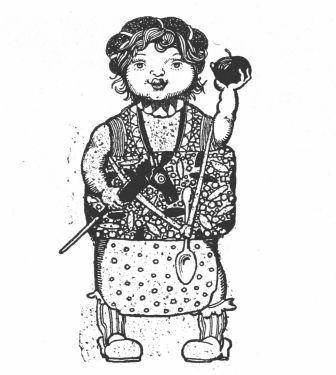 Children were built of much fewer Slices of Cake than the
Grown-ups
Children were built of much fewer Slices of Cake than the
Grown-ups
Here the Chief Contractor again made a very strong objection.
"It's important," he said, "that every year on their birthdays we should insert a slice of cake in these little girls so that they should grow tall enough to suit their age."[Pg 55]
In the somewhat embarrassed silence which followed, Smaly discovered why the Wigs had such short legs and such long bodies.
"Of course, that is it," he said to himself; "each year on their birthdays somebody adds another tart or slice of cake to them, and they grow taller."
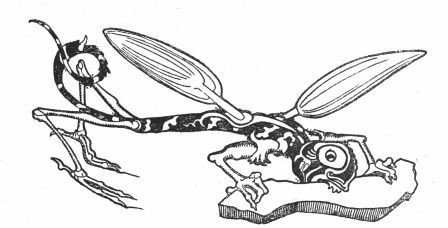 These Creatures will eat the Top off the Walls
These Creatures will eat the Top off the Walls
He glanced out of the window and saw that this was indeed so, that the children were built of much fewer slices of cake than the grown-ups.
The Chief Contractor now made a second objection.
"But what shall we do," he said, "when the garden wall of the eldest girl grows to be five feet high, for you mustn't forget that that is the height at which the fishes and lizards fly, so the wall will[Pg 56] never be able to be higher than five feet, for every night these creatures will eat the top off the walls."
It was again the Mother of the Crow who saved the situation. The dark hole in which she wore her eye when her son was not carrying it round his neck seemed full of intelligence. She placed her finger upon her brow without moving her arm (for the simple reason that she did not possess one), and said:
"When we can no longer make the walls higher, then we will sink the gardens as much as is needful."
All the same the Wigs could not accept this as a solution, for it seemed to them that men grew upwards and not towards the ground, that is to say, from the head and not from the feet.
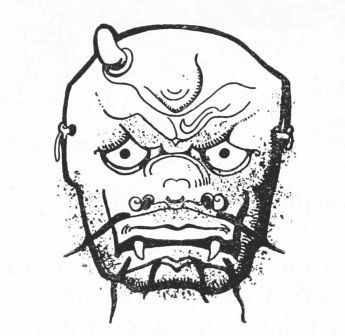 Anger
Anger
The Chief Contractor gave the matter due thought.[Pg 57]
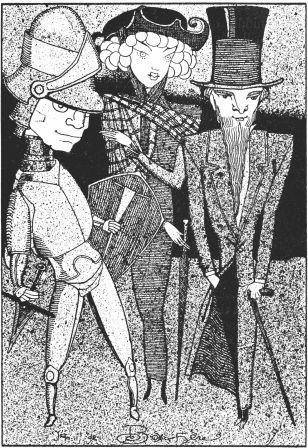 It seemed to them that Men grew upwards and not towards
the Ground
It seemed to them that Men grew upwards and not towards
the Ground
"We will place the annual slice of cake exactly in the middle of the girls," he announced, "and thus we will only have to sink the level of the gardens a little, and raise the top of the walls a little."
But since nobody seemed quite ready to accept this as a solution, the Chief Contractor again placed upon his face the mask called "Anger," and every one held their tongues from perplexity.
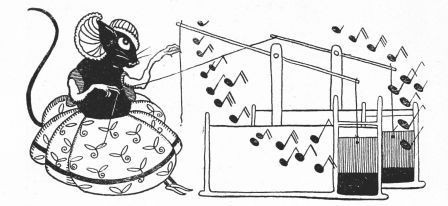 Some very Elegant Mice
Some very Elegant Mice
Happily at this moment the most charming music was heard upon the air. One could detect the scent of this music with one's nose, and taste it with one's tongue. One could see it floating out from various little boxes that some very elegant mice were opening and shutting with much delicacy and care.
"It's the review of the troops beginning," exclaimed the Young Stork in a loud voice as he tweaked the hundredth fish-bone out of the insensible back of the Despoiler.
Redy and Smaly watch the review of the troops: Smaly and the Mother of the Crow discourse about soldiers: The Chief Contractor distributes the food, and the Wigs pass through a curious little door: The Soy powder makes the provisions grow.
The Wigs now began to form themselves into a semicircle, the smallest nearest the door, and the others standing behind them so that they could see over their heads.
It was a half-holiday for Laptitza, the second daughter of the Prisoner, and Papylick brought her in so that she could see the review of the troops.
Laptitza was shown to a low chair in the midst of the semicircle formed by the Wigs.
Laptitza was so beautiful that it would not have been possible to have painted her portrait.
The soldiers arrived in Indian file, one behind the other.
"There are a hundred and two of them," announced the Chief Contractor, looking furtively at Smaly. He shot this look through the eyeholes of the mask which he had just slipped on and which appeared to be made in two halves, for while one[Pg 60] half expressed severe authority, the other was all gentleness.
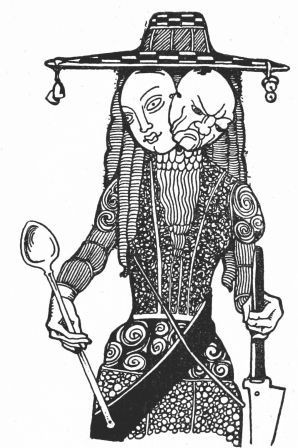 One Half expressed Severe Authority, the Other was All
Gentleness
One Half expressed Severe Authority, the Other was All
Gentleness
"One hundred and two," repeated Smaly in a perfectly expressionless voice.
"My brother used to have only one hundred," said the Despoiler, "but I made him understand that they could not possibly march until they had one at the head and one at the tail, and that makes one hundred and two." It was now the Despoiler's turn to look slyly at the two little human beings and see how they took his remark.
The soldiers came on in a straight line towards the great door of the kitchen. They had an extraordinarily complicated method of marching, taking two steps in advance and then one backwards, and this was made all the more difficult for them because discipline enjoined that each man should place his[Pg 61] feet accurately in the footsteps of the leader. This man's feet, by an ingenious arrangement, left white marks in the ground.
When the leading soldier arrived at the door, since it was not permitted him to turn his back upon such an august assembly, he had to take his departure marching backwards, and so had all those who followed after him. From that moment there were two long lines of soldiers, one going forwards, the other going backwards; but all the soldiers had their noses, their chests, their knees, and their big toes pointing in the same direction—the door of the kitchen.
When the review was over, the Chief Contractor was so pleased that he decided that they must have a similar review every week. He had a fence erected round the traces left by the soldiers' feet, so that they would not be effaced, but could be used again each week.
Just as this was finished Smaly noticed that the eye of the Mother of the Crow was regarding him steadfastly. Suddenly the eye winked as though to signal him to approach. Smaly began to walk towards the eye; but it occurred to him on reflection that it was towards the Mother of the Crow herself that he ought to turn his steps, and not towards her eye, which, after all, was merely hung in a locket round the neck of her son. Therefore he turned and approached the oyster-shell, where the Mother of the Crow was seated.
The Wigs were no longer taking any notice of[Pg 62] him; they were eating ices, and chatting together in their mellifluous voices. They had all put on thick gloves, for the warmth of the fresh pastry of which their hands were composed would have melted the ices.
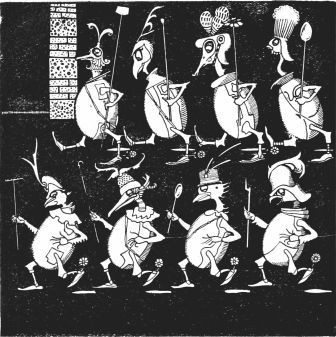 He decided that they must have a Similar Review every
Week
He decided that they must have a Similar Review every
Week
"None of them really knows what a soldier is,"[Pg 63] said the Mother of the Crow in a low voice to Smaly.
"Oh," said Smaly; "but you know, don't you?"
"Certainly I know. Soldiers are beings who cut up the meat that men like you eat, who hack down big trees, who kill the beautiful horned animals for food. You see I know perfectly well what a soldier is, and one can always tell a real soldier because he carries big knives, axes, saws, razors, and scythes."
"H'm! Not at all," contradicted Smaly with the air of one beginning a lecture. "A soldier is a man who fights other soldiers."
"What?" asked the Mother of the Crow. "How is that possible when they are both the same thing?"
"I assure you that it is so," replied Smaly.
The Mother of the Crow reflected; but catching sight of the Wigs, who were putting the soldiers back in their boxes at the end of the courtyard, she began again.
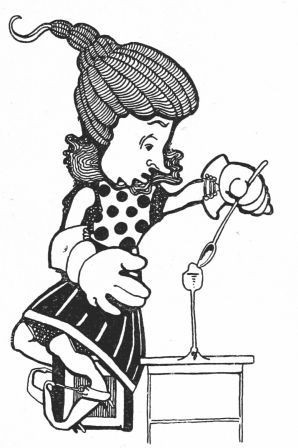 They had all put on Thick Gloves
They had all put on Thick Gloves
"He," she said, nodding her head towards the[Pg 64] Chief Contractor, "has no idea of what a soldier is. He has never seen one excepting in a painting that a cousin sent him. It is a painting that represents a court in full dress. There are several soldiers with knives standing round the cousin, who is the President of the Republic of Pasenipus. They wear breastplates of gold to prevent the blood of the animals they kill soiling their fine coats. The Chief Contractor thought that these breastplates must be eggs, and, as you see, these soldiers are just eggs with legs. The Chief Contractor has had oxeye daisies fastened to their heels, because in the picture there were golden daisies fastened to the boots of the soldiers."
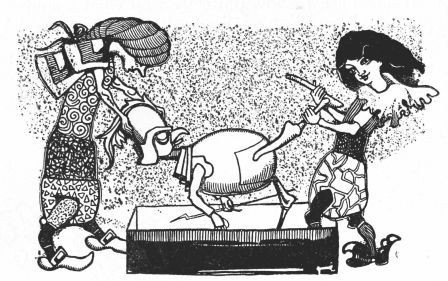 Wigs, who were putting the Soldiers back in their Boxes
Wigs, who were putting the Soldiers back in their Boxes
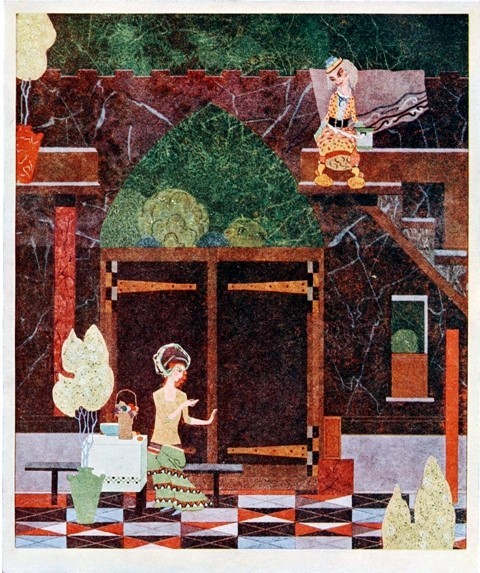 LAPTITZA AND PAPYLICK
LAPTITZA AND PAPYLICK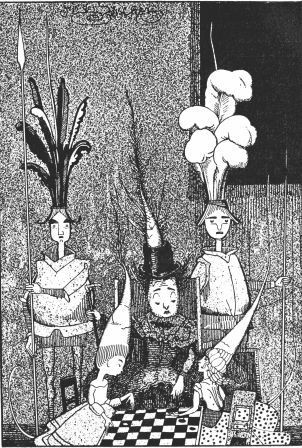 President of the Republic of Pasenipus
President of the Republic of Pasenipus
"Those must have been spurs!" explained Smaly absently, his attention being distracted by a curious rattling noise from afar off.
"I don't know what spurs are," admitted the Mother of the Crow; "but the Chief Contractor doesn't even know what the shield is that each soldier carries to protect his face from the horns of the animals. He doesn't even know that soldiers carry knives," she added, "but has put in his soldiers' hands flowers with long stalks. He doesn't know what a helmet is, for he thought that soldiers must be a sort of bird with a plume on their heads."
Smaly didn't mind. He had very much admired the feathered heads, and, above all, he admired the shields, which were made of pearly shell-fish, but before the review the Wigs had eaten the contents of these beautiful shields lest the shell-fish should all have hidden their faces from fright.
When the Wigs had placed the soldiers in the boxes the Young Stork and Papylick came towards Smaly. The Stork took charge of the Mother of the Crow to conduct her back to her house, which was in a cosy nook in a great tree of coral.
Smaly and Redy now wished to go, but Papylick informed them that neither the sun nor moon having yet set, it was not possible, and so the little husband and wife sat down on their heels in the doorway of the kitchen.
The rattling sound had now come nearer, and[Pg 67] the Chief Contractor appeared in the public square surrounded by Wigs pushing wheelbarrows and turning rattles.
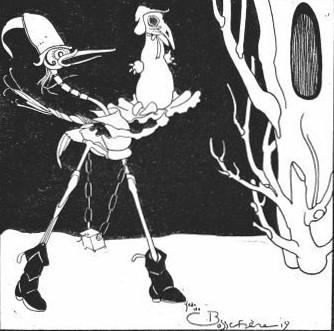 To conduct her Back to her House, which was in a Cosy
Nook in a Great Tree of Coral
To conduct her Back to her House, which was in a Cosy
Nook in a Great Tree of Coral
These Wigs laid the rattles in the wheelbarrows, and everything became quiet once more.
Then the Chief Contractor advanced boldly into the full sunshine, and the Wigs, who watched him[Pg 68] put one foot in front of the other, prepared also to advance.
The Chief Contractor had made a few changes in his costume. He still wore his big ring and his box marked "Soy"; but a huge hat now covered his head. Little shelves were hung all about his person, and on these and on his hat were placed pots and jars, cakes and flagons. He had many more than the Confectioner, who, after all, was only his lieutenant. He carried a quiverful of ebony knives, and an urn from which stuck out long bamboo spoons. His masks were slung from the end of a stick. He touched his lips with his magic ring, then he agitated the castanets which hung at his knee, and cried:
"Food, food! Come in by the door, come in by the door," and he shut his mouth up again quickly with his left thumb.
"I don't see a door, or even a place for a door. There isn't anything," said Smaly to Papylick.
"There it is," said Redy, pointing towards a little door which stood in the middle of the square. "There's no wall, but that is a door. See, it's open," she added.
"But what's the good of that door," cried Smaly to the Chocolate Grub, which had come up beside him and was waiting with the others to go and get his provisions.[Pg 69]
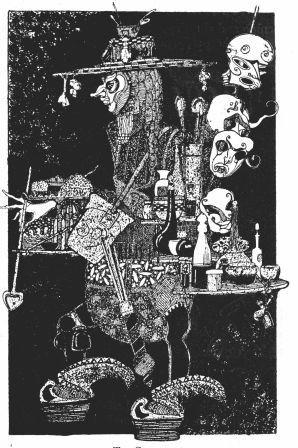 The Confectioner
The Confectioner
"I know nothing about doors," said the Grub sharply. "You must ask some specialist in such matters; some one who knows about draughts and opening and shutting. Some one, in fact, who looks like a doorkeeper," and the Grub withdrew proudly.
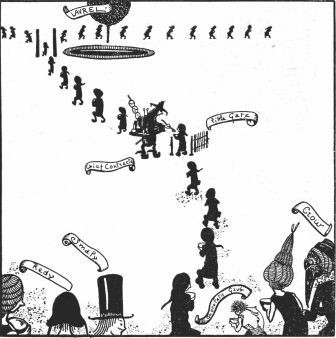 "Nevertheless it's so narrow that only one person can go
through at a time"
"Nevertheless it's so narrow that only one person can go
through at a time"
Smaly realized that he had been lacking in tact to mention the word "door" to the Grub, who always pretended that he was not a doorkeeper. Papylick explained to the two little people:[Pg 71]
"If there weren't a door the people would simply tear the Chief Contractor to bits to get at the food."
"But——" began Smaly.
"And anyway the door was open," said Redy.
"That's true," replied Papylick, "but nevertheless it's so narrow that only one person can go through at a time."
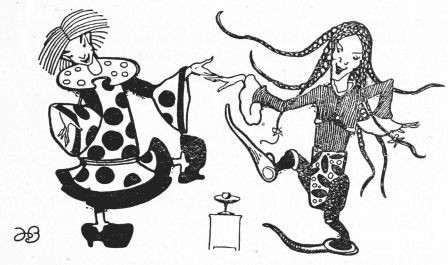 The Song went on
The Song went on
And, indeed, each Wig was passing singly through the little door to receive in his pot or pan a drop of gooseberry jam or a morsel of cake or apple, or one or two cherry-stones.
The Chief Contractor served out his goods with his bamboo spoons. When the Wigs were served they made their way in single file towards two posts which stood in the square, and passed very carefully[Pg 72] between them so as not to spill any of their precious provisions.
And every one had received from the Contractor a little powder in a box like a small snuff-box labelled "Soy."
Back in their kitchen the Wigs sprinkled a pinch of the Soy powder on their crumbs of cake and spots of jam, and then taking hands danced slowly round the table, singing, while the little crumbs of food began to grow bigger and bigger. The fragments of cake became whole cakes, the spots of jam swelled to marvellous jellies, and the cherry-stones became baskets full of the most succulent fruits. When they had finished their song they did not shut their mouths up again, thereby attaining two excellent results—the song went on and on while they could eat their dessert at their ease.

The Sugar-Cane Prison arrives: The Rats water it with Soy fluid to keep the canes growing as fast as the Prisoner breaks them down: The time for siesta draws on, and Smaly and Redy go into the house of the Historian.
While the Wigs were in the kitchen, and Smaly and Redy were seated in the doorway sharing Papylick's provisions, distant cries rose upon the air. Smaly and Redy turned to gaze out at the public square, which was hot and empty; but in a moment several Wigs arrived at the far end, running hard with their little short legs, and crying out:
 Running hard with their Little Short Legs
Running hard with their Little Short Legs
"The prison has turned round, it's coming in this direction."
The Chief Contractor, who was eating in the kitchen in company with the Despoiler, the Confectioner,[Pg 74] the Crow, Mistigris, the Stork, and various other people, precipitated himself towards the door, followed by the rest. Listening to their scraps of conversation Smaly gathered that the Wigs held some stranger captive, and that this prisoner lived in a perambulating prison which travelled about the country. This astonished Smaly very much, as, indeed, it would have astonished you had you been in his place. Even I, who have seen many strange things, was very astonished when I first heard about it.
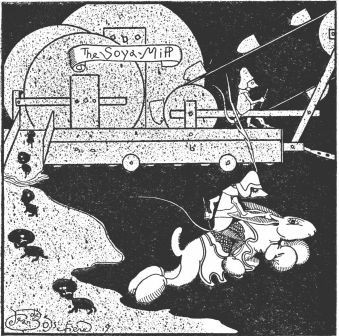 Soy Mill
Soy Mill
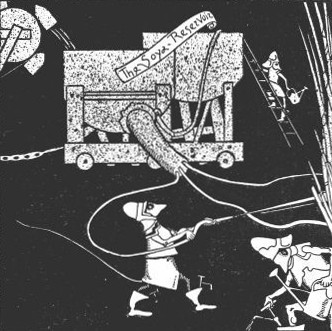 Soy Reservoir
Soy Reservoir
The shouting grew nearer, and there appeared at the far end of the square a forest of sugar-canes moving steadily onwards. The canes reared up into the air like rockets which never rose any higher, or[Pg 76] like a field of gigantic corn, and they formed a solid wall which came ever nearer and nearer.
The wall came onward and hit against a house which stood in its way, and mowed it down. The sugar-canes were far more powerful than the pastry of which the house was composed.
The sugar-cane forest came closer, so close that Smaly and Redy perceived how amongst the base of the canes there was a multitude of Water-Rats who were busy watering the roots.
These Rats were all provided with large mackintoshes, which, however, they took off for greater freedom of movement while they were watering. They wore boots like those you see upon the men who clean out drains, and each Rat had upon its head a fireman's helmet similar to that worn by the Stork.
Some watered with a watering-can, some with firemen's hose, connected with reservoirs shaped like enormous bottles of champagne, and mounted upon wheels.
One of the Rats, who wore a long red feather trailing from its helmet, was mounted upon a Hare whose pads were wrapped in linen. The Rat galloped backwards and forwards upon the Hare from the forest to a big windmill marked "Soy," where the reservoirs were.
Still the forest kept on advancing until the quiet square was transformed into a den of noise and activity. The sugar-canes grew higher and more numerous every moment under the influence of the[Pg 77] water of Soy, which was as productive as the Soy powder.
The kitchen was by now emptied of everything movable; the Wigs ran hither and thither carrying away every object that they could lift, as people move furniture when a neighbouring house is burning; only Smaly and Redy remained, stupefied before this moving forest which marched down upon them.
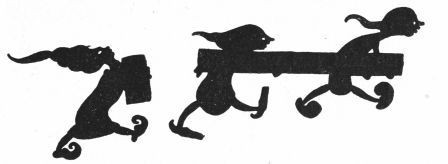 Carrying away every Object that they could lift
Carrying away every Object that they could lift
When it was almost on them they ran to one side, and there, where the sugar-canes were less thick, they could see into the heart of the forest, and they saw crouching within it a strange-looking man dressed in rags. Little of his face showed between his long hair and his tangled beard. He wore no shoes; but carried at the end of a string several boxes of matches. Perpetually he made the same rhythmic gesture with his arms, and with every gesture the sugar-canes around him broke as if they were made of brittle glass. His eyes stared straight[Pg 78] in front of him, and he seemed to be laughing to himself.
"He is a madman," said Redy.
"They have driven him mad," replied Smaly in a low voice.
Smaly and Redy joined hands. "We ought to save him," they said together.
The Prisoner never ceased to break the sugar-canes, and fresh canes sprang up around him also without a pause.
Fish that had wings and paws flew above the forest, brushing the heads of the canes with their ringed noses. Whenever they did this the sugar-canes seemed to shrivel up and vanish.
And thus the forest advanced, new canes springing up ahead, and the old canes withering behind; but always surrounding the Prisoner, no matter how he shattered them.
Now these rings which the Flying-Fish wore in their noses had been fixed there by the Despoiler, and the rings worn by all the Wigs came from the same source and served the same purpose, that of stopping all growth. This was how the Despoiler came by his name, for mere creature of insensate pasteboard as he was, he had the power from his magic ring to arrest all life—a blade of grass in the ground, or the passage of a bird in the air.[Pg 79]
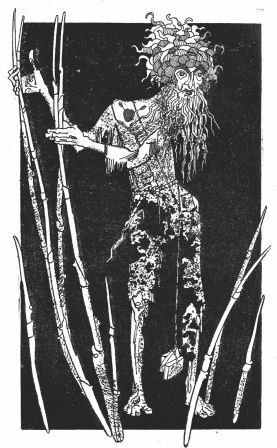 The Prisoner
The Prisoner
Suddenly the Prisoner paused in his frantic toil and fell asleep like a child. The rats also left off their work and wrapped themselves in their mackintoshes.
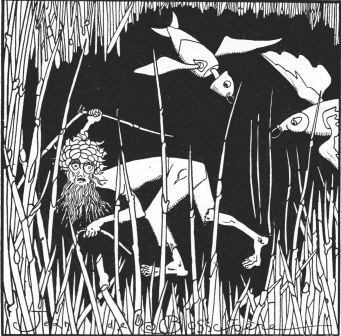 The Prisoner never ceased to break the Sugar-canes
The Prisoner never ceased to break the Sugar-canes
Smaly and Redy wished to attract the attention of the Prisoner; but the strange man slept on, and they did not dare speak to him too loudly, for they were afraid that he might be quite mad, and also they did not know how the Wigs would take interference[Pg 81] with their prisoner. Indeed, Papylick and the Young Stork had already noticed what they were trying to do, and since the kitchen had been destroyed by the passing of the forest they now drew Smaly and Redy gently but firmly into one of the houses in the square.
"This is the house of the Historian," said Papylick, "and here you must stay until the setting of the sun."
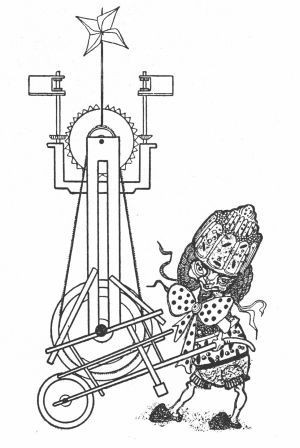
The Flying-Fish announces the hour of three, and the World falls asleep: The Hen makes six hard-boiled eggs: Smaly and Redy begin to read the manuscript of the Historian.
Smaly and Redy found themselves in a room that was rather dark in spite of the fact that the sun was still high in the heavens. There were only four windows, one placed so low down that the Wigs, even when seated, could observe what passed. Another, very little higher, was for the Wigs to look out of when they were standing on their short legs. These two windows had already been in existence when the Government of the country offered the house to the Historian to enable him to write the chronicles of the inhabitants.
The Historian put in an indent asking for two more windows, and succeeded in obtaining them. The first of the new windows was put alongside the old one, which had been for the use of the Wigs standing; but this new window was for the Historian when he was sitting down, as he was twice the height of an ordinary Wig. The fourth window was set very high to allow of the Historian looking out on the market square as he walked about.
It will be seen what bright ideas this Historian[Pg 83] had; but the result of one of his brightest was to be seen in the ceiling, where there were two circular holes, one much bigger than the other.
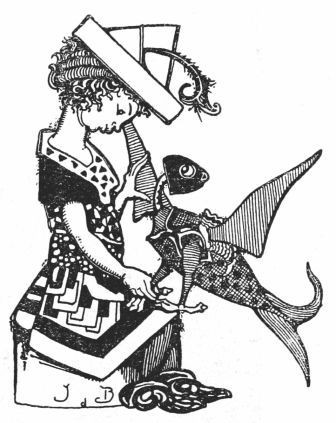 The Pet Flying-Fish, which every Wig Family possesses and
cherishes
The Pet Flying-Fish, which every Wig Family possesses and
cherishes
The big hole had been there for a long time and had been made to allow of free exit and entry to the pet Flying-Fish, which every Wig family possesses and cherishes, much as you or I cherish a dog or a cat; but when some one made the Historian a present of another and much younger Flying-Fish, he at once caused a smaller hole to be made so that his new pet also could come in and out as it pleased.
Redy and Smaly found the Historian sitting in a corner of his room studying a piece of paper through a telescope, and taking notes as to what he saw. The little husband and wife shut the door gently behind them and remained very quiet. They were quite alone with this curious and enormous being, who took no more notice of them than if they had been a couple of mice.
It was the first time that Redy and Smaly had seen the interior of a Wig house, and they found it resembled nothing so much as the laboratory of an[Pg 84] alchemist or astronomer. The thing Smaly and Redy admired most was a large globe upon which all the Wig possessions were painted in red.
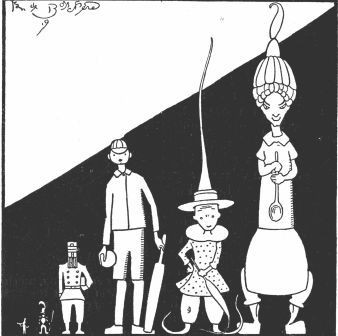 The Amount of Cake and Pudding eaten Annually in the
Country
The Amount of Cake and Pudding eaten Annually in the
Country
At first they were very astonished to see how big the Wigs' country appeared to be; but after a little study Smaly suggested that the areas covered in red must represent the importance morally and[Pg 85] mentally of the country rather than its geographical area, and this Redy agreed with, for she had found ranged in a row beside the globe a lot of little painted cardboard figures of different sizes representing the amount of cake and pudding eaten annually in the countries represented by these little figures; which were the Wigs' country, Parseny's Land, England, France, Italy, and Belgium, and the Wigs' country was the biggest of the lot.
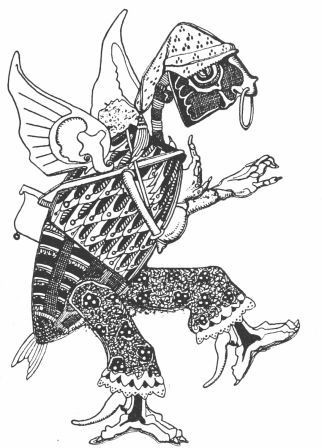 The Elder of the Fishes
The Elder of the Fishes
While the little husband and wife were discussing this in low voices so as not to disturb the Historian, the elder of the Fishes flew in. With great difficulty it scraped through the small hole instead of its own. It flew to its perch, and announced in a clear voice:
"Three o'clock has struck."
It said these words to a Hen who was sitting[Pg 86] upon a coal-scuttle, busily making little white and yellow pasties.
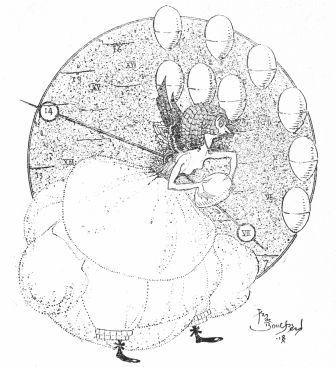 The Hen
The Hen
Having made this announcement the Fish pulled down its eyelids with its left paw, buried its nose[Pg 87] in a nightcap, wrapped its wings round its head, and went to sleep. The Hen seemed very agitated by the Fish's words, and began to work harder than ever.
She wore a peruke like all the Wigs, and an infinite number of skirts made of butter muslin. She looked at the clock, for the big hand had stopped at two, whereas the little hand was at the hour of three. While she gazed at it the left foot of the Historian shot out and brought the little hand round to six o'clock.
At once the Hen started rolling out six yellow balls upon her pasteboard. These she wrapped up in a white crust and then hid them in the pockets of her skirts and sat upon them, while she made fourteen more eggs out of the white and yellow paste.
"The little hand must be to ask for six hard-boiled eggs," whispered Redy to Smaly.
At that moment Smaly, who was staring out of the window, nudged Redy, and looking out together they saw that the Wigs, who had been busily rebuilding the kitchen, had all fallen asleep in the market square because three o'clock was the hour of the afternoon's rest. The Confectioner, his hair streaming in the wind, was running hard towards his own house. He held by the hand Fritilla, the youngest of the Prisoner's daughters, whose big eyes were looking all about her as she ran. The Confectioner pushed her rapidly into his house and shut the door upon her, then he, too, fell asleep in the square like the other Wigs. This care which the[Pg 88] Confectioner took of Fritilla was by no means unnecessary, as for several days she had been pursued by an enormous red Flying-Fish which declared that she had stolen from it its seven hundred and eighty-secondth feather. It declared that it had seen the plume actually in her hands, and that when it had gone home and counted its feathers over before going to sleep that night it only possessed seven hundred and eighty-one.
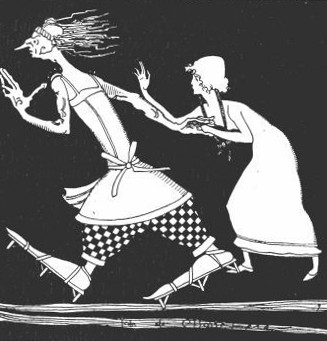 This Care which the Confectioner took of Fritilla was by
no Means unnecessary
This Care which the Confectioner took of Fritilla was by
no Means unnecessary
The smaller Flying-Fish now flew into the Historian's room, using its own little hole. It hated using this; but it seemed an even greater humiliation to use the big one, for that made the poor little Fish feel smaller than ever. Thus it came about that neither the big nor the little Flying-Fish ever used the larger hole, which had become all overgrown with delicate mosses and stonecrop, and even by a fine yellow wallflower. The windows in this country, if people did not look through them often enough, became almost opaque.
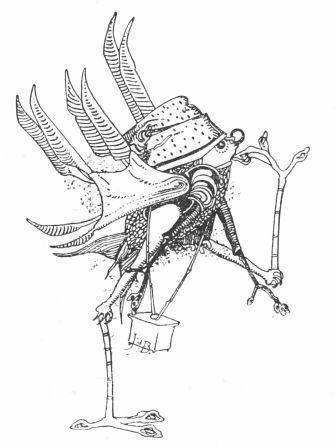 The Smaller Flying-Fish
The Smaller Flying-Fish
The little Flying-Fish seated itself on its perch, and called out:
"It's nearly half-past three. We must rest. Everybody must rest. Let's go to sleep." And it, too, pulled down its eyelids with its left paw, buried its nose in a nightcap, and wrapped its wings round its head.
The Historian stretched out a hand, took the six hard-boiled eggs from the Hen, dropped them through a hole in his[Pg 90] beak, put the hand of the clock back to zero, then he, too, shut his eyes.
"He sleeps," murmured Smaly and Redy.
Smaly tiptoed across to the Historian.
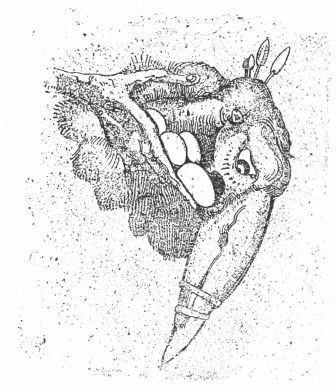 Dropped them through a Hole in his Beak
Dropped them through a Hole in his Beak
He was a curious sort of man, extremely thin, his face dominated rather than adorned by an immense beak, which apparently he could not open; and he had little twinkling eyes like an elephant's, which twinkled even more when they were shut than when they were open. He wore a sort of wrapper, trimmed with fur round the neck, sleeves, and legs. Neither Redy nor Smaly could quite decide what the Historian was made of, whether of Manchester pudding, of pie-crust, or gingerbread, and they did not dare try and taste him for fear of waking him up.[Pg 91]
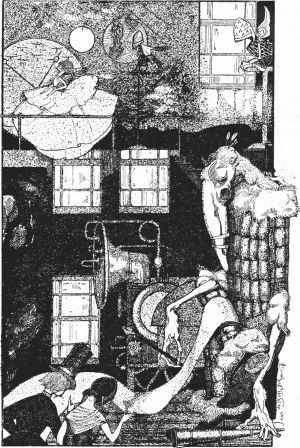 Was sitting with One Ankle across the Knee of his Other
Leg
Was sitting with One Ankle across the Knee of his Other
Leg
The Historian was sitting with one ankle across the knee of his other leg, and had rolled round his thin calf the manuscript upon which he had been working. This manuscript was trained to roll itself up slowly round his leg whilst he wrote it.
Smaly looked carefully all round him. The Hen was sleeping, the two Fish slept also, the Historian slept profoundly without snoring. He had always wanted to be able to snore; but he could never succeed because of his beak, and therefore he had invented a sort of little suction-pump run by a motor, which he kept beside him, and which snored quite as well as a man.
Except Smaly and Redy every one was sleeping in the house of the Historian. Outside in the sun-baked square the Chief Contractor, the Confectioner, Mistigris, the Young Stork, and the Crow slept also, heaped one upon the other in a casual manner, only the Despoiler, who was always afraid that some one would find out that he was only made of cardboard, never slept in public. He always retired to rest in a little room under the roof of his house.
When Smaly had made quite sure that there was no one to see them, he took Redy by the hand and began gently to unroll the Historian's manuscript. Smaly and Redy began to read it to each other in low voices, word by word, like children who go upstairs one leg at a time. This is what they read:[Pg 93]
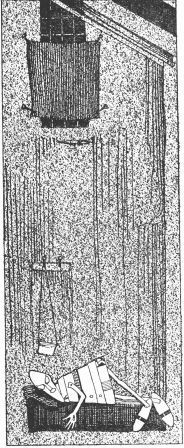 The Despoiler, who was always afraid that Some One would
find out that he was only made of Cardboard, never slept in Public
The Despoiler, who was always afraid that Some One would
find out that he was only made of Cardboard, never slept in Public
"Thursday, half-past three.
"All buildings except the cherry-tart destroyed in the market square.
"The Prisoner crossed the river while it was dry.
"Rolled across the park of chocolate-moulds, crushing everything beneath him.
"He then rolled on over the great kitchen, which was happily empty.
"(The two little people made of suet have been shut in with me.)
"Up past the public square, and the two little people tried to talk to him.
"The Rats worked hard at keeping the prison together; but there are cries everywhere.
"Every one is calling out 'The Prisoner is coming.'"
"How annoying this is," said Redy, "we're reading it backwards."
"Annoying," said a deep voice which came from the closed beak of the Historian. He had forgotten that he was asleep, and lifting up his foot he kicked the two inquisitive little people to the other end of the room.
But the sight of the Flying-Fish and the Hen sleeping reminded him that he, too, was not really awake, so he closed his eyes and did not move again.
Smaly was able to go on unrolling the whole of the manuscript.
Redy and Smaly read of the childhood of the Prisoner.
They read as follows:
"This is what I, the Historian, have been able to discover about the life of Djorak, called The Prisoner, before he came to us. He told it to me himself before he was placed in his prison of sugar-canes.
"He is a sailor.
"He has been tattooed.
"Nearly everything that has been tattooed upon him is very terrible; for instance, one can read upon his shoulder-blade:
"'Eat meat raw if you can't get it cooked.'
"Indeed, he has himself avowed to me that he used to eat all sorts of animals, rabbits, sheep, and even birds.
"On his other shoulder was written:
"'Avoid water like poison.'
"He had also inscribed about his person:
"'Drink your gin and whisky neat.'
"'Always have a hot drink in the evening.'
"'Reverence the sun and each of the winds as it blows.'[Pg 96]
"On his breast he bore a heart cruelly transfixed with arrows.
"I gathered that from his childhood he was rough and disobedient. That when as a little boy he used to go into the wood behind the house to smoke, his mother always followed him and carefully presented him with an ash-tray, yet he never made use of the tray; but kept it in his pocket and scattered the ash all over the wood.
"Instead of cutting his toe-nails as we do with the help of a long-handled pair of scissors and a telescope, he preferred to take each nail off separately, trim it, and put it back, although this invariably made his mother cry.
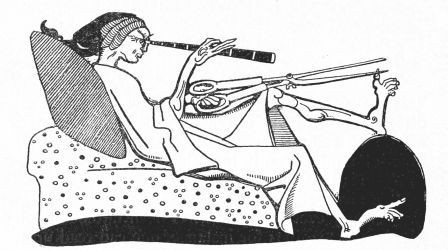 "Instead of cutting his toe-nails as we do with the help
of a long-handled pair of scissors and a telescope"
"Instead of cutting his toe-nails as we do with the help
of a long-handled pair of scissors and a telescope"
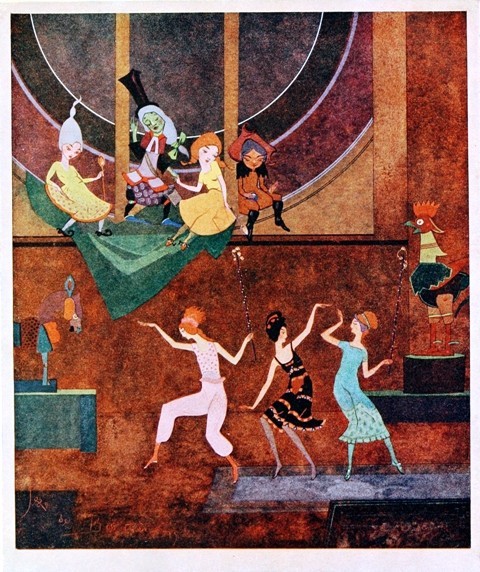 SOME OF THE DANCES WERE VERY COMPLICATED
SOME OF THE DANCES WERE VERY COMPLICATED"He was so perverse that when any one asked him what the time was he would always insist on telling it by the barometer, although he knew perfectly well that the exact time is only to be found on the clock.
"He always marked out the tennis-court with green chalk, because he maintained that the white looked too loud and left marks upon the grass.
"Evidently from his earliest youth he was of the stuff of which criminals are made.
"When he grew up he married and became the father of three adorable little girls."
At the mention of the three little girls Redy and Smaly stopped and looked at each other.
"Those are the three little daughters of the Prisoner," whispered Redy.
Smaly went on reading:
"When his wife died," Smaly read, "he decided to give to his daughters a good, if rather original education.
 The King
The King
"Every alternate week he dressed them as boys, and during that week they behaved as boys, and the next week they would become girls again. 'That will accustom them to anything,' he used to say.[Pg 98] 'Nothing in life should be difficult to them after that.'
"Three young men fell in love with them, but unfortunately called on their father to demand them in marriage one Monday morning when the three girls were dressed as boys, and considered as such by their father.
 The King's Daughter
The King's Daughter
"The three young men were thrown out of the house with great violence by the infuriated parent. One young man lost his hat, the second lost his arms and his walking-stick, and the third lost one of his legs.
"Certainly Djorak's love for his daughters was very intense.
"It was this love which was his ruin.
"One day in the presence of the King of his country he boasted of being the father of the three most beautiful young girls in his country.
"What an imprudence! The King himself possessed a daughter whose beauty, to say the least of it, was not remarkable, and the King, who was very intelligent, was perfectly well aware of the fact. He was furious when he heard Djorak's boast. He had him arrested and tried before the high court, who decided that the[Pg 99] punishment of death was barely sufficient for such an audacious criminal.
"The punishment of death in Djorak's country is by beheading with the sword; a criminal's head is only cut off once—but it is once and for all."
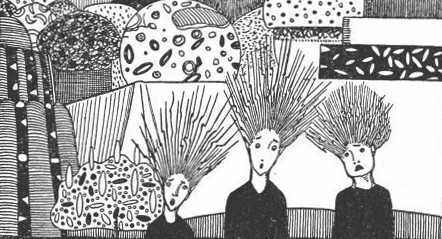
The elder Flying Fish loses one eye, and the Hen finds it: The Historian wakes up, and Smaly and Redy run out of the house: The Healer mends the paw of the Confectioner.
The Flying-Fish upon their perches now began to shake their wings and then their paws, and last of all their heads.
"Are we really awake?" asked the elder Flying-Fish of the younger.
"It seems to me that we are more or less shaken up," replied the little Flying-Fish.
The two Fish prepared themselves to fly forthwith once more upon their arduous duties, for the Flying-Fish in this country act as sentinels and look-out men, and also cry the hours publicly.
Just as they were about to set off the little Flying-Fish noticed that the other had lost an eye.
"That must have been when I shook my head," exclaimed the elder Flying-Fish with conviction, and both flew down on to the floor to look for the missing eye. The Hen joined them in their search, and as she fluttered down she managed to upset a glass retort from which an opalescent vapour began to escape.
Soon the whole laboratory was filled with this[Pg 101] vapour in layer upon layer of different colours, from deep rose at the base up through violet and pale green to a layer of no colour at all, which was succeeded by a layer of blue.
Through the vapour Smaly and Redy could hear that the Fish and the Hen were continuing their search for the lost eye. Sometimes they were quite near the two little people, although no one could see any one else.
It was the Hen who finally discovered the lost eye.
"Why, it's still shut," said the younger Fish to the elder.
"Doubtless it must have fallen out before I had really shaken myself awake," replied the elder.
Taking the eye from the hands of the Hen, the Fish held it in its cupped paws to shake it, as one shakes a coin, to see whether it will come down heads or tails. When it had been well shaken the eye was open.
The little Fish took the eye and replaced it in the elder Fish's head; then they both flew out, making a buzzing noise like gigantic bluebottles.
The layers of coloured vapour now began to twirl about and mix like wreaths of steam, and once again various objects in the room became visible. The Hen saw that the big toes of the Historian had begun to move, and knowing that these signs of wakefulness would presently mount as far as his[Pg 102] head, she hastened back to her little pots of white and yellow paste.
Indeed, the Historian was already almost awake; he had put down his hand and stopped the little snoring machine.
Smaly and Redy joined hands and ran out of the door.
Directly they appeared in the square the Wigs seized hold of them and ran them into the kitchen once more, which by now had been built up again. Smaly and Redy began to hope that the evening was not far off, for they were becoming more and more anxious to see the three girls. They opened their mouths and began their little chant:
But at this moment Redy noticed that the sun had not moved during all the hours of the siesta. Nobody had explained to them that since all the Wigs had been asleep the sun had naturally thought it would be ill-mannered to continue his advance.
Redy and Smaly stood alone in the kitchen wondering what to do, when the door opened and a middle-sized man walked in, saying in a severe voice:
"Where the dickens have those idiots got to?"[Pg 103]
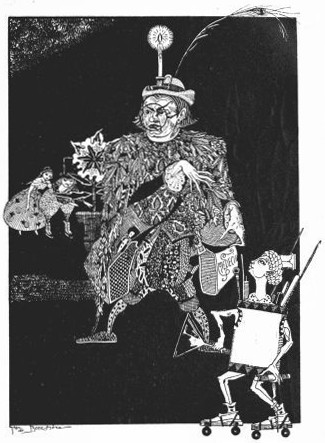 The Healer
The Healer
Smaly hid himself behind Redy, and Redy hid herself behind a large plant, which grew in one of the ornamental vases at the side of the Chief Contractor's throne.
 Born with the Idea of One Day being a very Big Man
Born with the Idea of One Day being a very Big Man
The man who came in had evidently been born with the idea of one day being a very big man. But he had been destined by his parents to become a great Healer, and as soon as he had discovered this it occurred to him that it would be better to be merely of medium height, so that he did not have to make his back ache bending over the beds of sick people. Therefore he at once left off growing, excepting in girth; and since he always wished to ride about the country it was obvious that he did not want his legs to be too strong, therefore he had small legs, enormous shoulders, a hump both back and front, and a large stomach.
The Healer was accompanied[Pg 105] by a page made in the shape of a drum. This drum, besides having the head of a page and two solid little legs mounted upon roller-skates, was hung about with an immense number of instruments, with tubes of gum, sealing-wax, and candles. In one of his hands he carried a funnel made of fish-glue, down which he poured medicine into the mouths of sick people.
In the other he had a corkscrew for pulling out bad teeth.
"It's simply freezing in this horrible kitchen," said the Healer, looking about him. "Where on earth have they got to?" Then turning to the page he added: "Fetch my cloak out of the right-hand pannier."
He gave a shove to the drum, which skated off to the door where two donkeys stood side by side. One donkey could certainly never have supported the Healer, therefore he had to have two, and between them was fastened a comfortable arm-chair. The page came back trailing a large cloak behind him, made of the leaves of aromatic herbs.
When the Healer had put it on he looked like a mound entirely covered with ivy. The bag which he carried slung on his right-hand side was almost hidden by his cloak, so was that on his left.
Upon one of these, which contained little bottles and boxes, one could just read the word "Medicines," and upon the other "Rewards to be taken after medicine."
The Healer continued to call out "Where are they, where are they?" gazing everywhere through his large single eyeglass, which was so big he could look through it with both eyes at once.
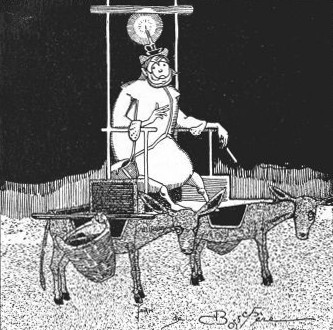 Between them was fastened a Comfortable Arm-chair
Between them was fastened a Comfortable Arm-chair
He drew near to the plant behind which Smaly and Redy were hiding, and just as it seemed as[Pg 107] though he must discover them, they managed to hide themselves beneath the folds of his cloak. They were only just in time.
The Chief Contractor, the Crow, and the Despoiler, followed by several Wigs, now came in.
"Where are they?" cried the Healer, turning towards them.
"Here is the first of them," answered the Chief Contractor, pointing to the Confectioner, who was being supported by Mistigris and Papylick; and Smaly and Redy, peeping out from beneath the cloak, began to understand that the Healer was not searching for them, but for sick people.
"Dear me. It's his paw that's hurt," said the Healer, and indeed this was not difficult to see, for the Stork had already laid down upon the table the broken paw of the Confectioner.
The Healer lit a candle, took his sealing-wax, and set to work.
Outside an agitated crowd had assembled.
Every one seemed to be crying and wailing.
Already in the crowd there were newsboys selling accounts of the latest disaster to the Wigs.
In the great square hundreds of frenzied people, at the risk of losing their shoes or their heads, danced frantically round and round.
"What misery, what misery," murmured every one in the kitchen, gazing at the mask called[Pg 108] "Supreme Sorrow," which the Chief Contractor had placed over his face.
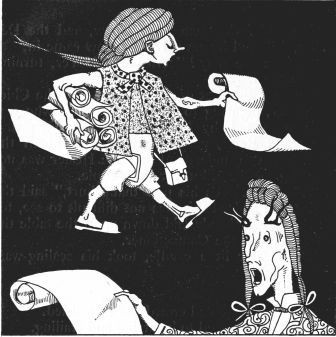 There were Newsboys selling Accounts of the Latest
Disaster to the Wigs
There were Newsboys selling Accounts of the Latest
Disaster to the Wigs
"Who on earth will rebuild the market square?" muttered the Young Stork, gently closing up with his nail some little holes which he had discovered in the back of the Despoiler.[Pg 109]
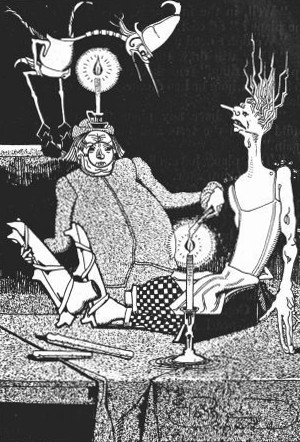 The Healer had finished his Mending
The Healer had finished his Mending
"Well, in the first place, who is going to draw the plans?" asked the Despoiler.
"We don't need any plans," answered Papylick.
"They will draw the plans after they have put up the building," remarked the Crow in a low voice to Smaly, whom he had discovered under the Healer's cloak.
"If they have any plans they can quite well build up all the tarts and puddings in the square again."
"The plans have all been burnt," announced the Chief Contractor.
"But in the first place no one knows whether the plans or the buildings were made first," objected the Crow.
No one had anything to say to this, so every one remained silent, sunk in the deepest perplexity. Papylick at last suggested that they should ask the advice of the Mother of the Crow.
By this time the Healer had finished his mending.
The Confectioner, placing his hand against his mother-of-pearl forehead, murmured, "I have a pain there."
"That must be the fever," said the Despoiler.
"Fever?" demanded the Healer sharply. "How can there be fever when I have glued his paw on again? He hasn't got fever at all. It's worrying that's given him a headache. What Wig worthy of the name is not worrying at this moment when such a grave and terrible problem lies before us."
The Wigs all imagine they suffer from headache: The Rats come to the Healer to be cured of the ravages of hot Soy: The Chief Contractor has to make himself ill eating the musical instruments.
Directly he heard the word "problem" the Chief Contractor put on the mask of the "Mathematician."
"It is indeed atrocious, this problem that confronts us," continued the Healer, "and who can there be amongst us who is not full of distress when he considers that in the whole of our country there is no one who can tell us whether we should begin by making the plans or the buildings. I trust for the sake of your honour that you all have a headache," and so saying the Healer walked towards the pair of donkeys.
"I, too, hope so," said the Chief Contractor, hastily slipping on the mask called "Migraine."
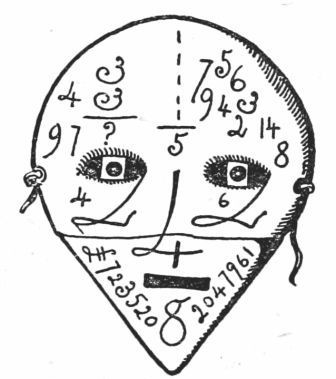 Mathematician
Mathematician
"I, too, hope so," said his wife, who had just come in.
You, gentle reader, will find on another page a portrait of this lady, who was extremely vain and dressed very extravagantly.[Pg 112]
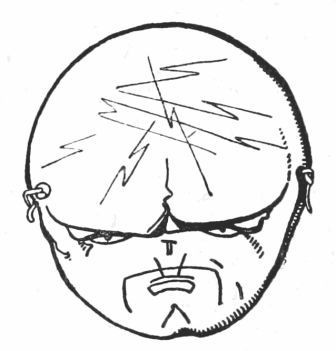 Migraine
Migraine
She bore a great resemblance to a butterfly.
"We all hope so," said every one in the kitchen, and the crowd in the square took up the remark, so that all over the town the Wigs were sighing and placing their right hands upon their foreheads.
Soon they felt so bad that they all wetted their handkerchiefs in the fountain of rose-water and wrapped them round their heads.
There was a great silence....
"I hope so, too," piped the Crow, a little late because he had only just succeeded in putting on his spectacles.
The Stork re-entered, pushing the Mother of the Crow in her oyster-shell, and followed by the Healer. At once the Stork began to pull out all the fish-bones which during his absence ill-natured persons had stuck in the back of the Despoiler.
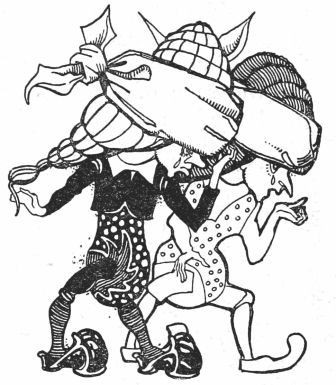 Wrapped their Handkerchiefs round their Heads
Wrapped their Handkerchiefs round their Heads
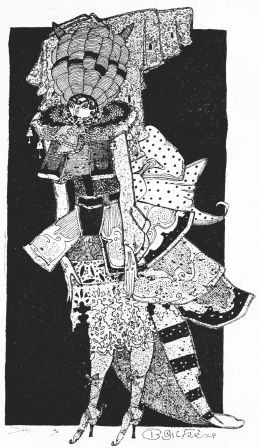 "I, too, hope so," said his Wife, who had just come in
"I, too, hope so," said his Wife, who had just come in
But all thought of the grave problem to be discussed was forgotten, for at this moment there entered many more victims of the travelling prison. (Smaly, who up to now had not been so very, very astonished at anything he had seen or heard since he had passed through the chocolate door, really was a little surprised when he saw these victims.)
The chief sufferers seemed to have been the Rats, whose business it was to keep the sugar-cane forest well watered. Nearly all had one leg which was much longer than the other, or a very long arm, or an elongated nose, or a tail that went on for ever.
"They must have been walking upon hot Soy," whispered a Wig to Smaly.
This Wig was a Dwarf with a very large head, and he carried a watering-can, out of which he perpetually drank a few drops.
Smaly and Redy, their eyes round with curiosity, questioned him eagerly.
"The Prisoner wanted to cripple us all for the rest of our days," said the Dwarf, drinking a little more water, for he suffered from a continual thirst.
"If you know what a match is," observed the Crow, settling his spectacles, "you will very soon understand what has happened."
"Yes," continued the Dwarf, looking anxiously into the bottom of his watering-can. "When the prison had crossed the square the Architect made an attempt to save the plans."
"By the Architect he means the Confectioner," whispered Redy to Smaly.[Pg 115]
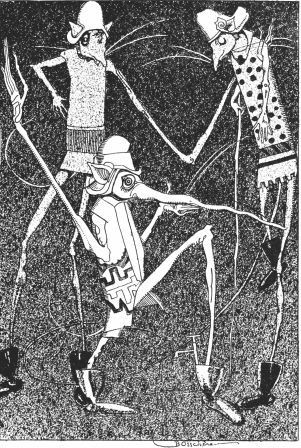 Nearly all had One Leg which was much Longer than the
Other, or a very Long Arm
Nearly all had One Leg which was much Longer than the
Other, or a very Long Arm
"He rushed after the Prisoner, crying out to him to stop; but the Prisoner only looked at him with his big eyes and, ceasing for a second to break the sugar-canes, seized hold of a little wax vesta. He stared at the Architect with eyes full of hate, and cried, 'I think no more of you than I do of this match.'"
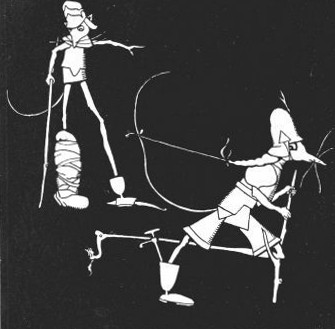 His Elongated Tail was tied to the Queue of his Wig
His Elongated Tail was tied to the Queue of his Wig
"No, no," interrupted one of the Rats, "that's[Pg 117] not how it happened at all." He carried one long leg on a crutch, and his elongated tail was tied to the queue of his wig. "That's not how it happened at all," he repeated.
"Do you mean to tell me he did not show the match?" asked the Dwarf.
"Certainly not," replied the Rat.
Smaly asked the Rat what the Prisoner had really done.
The Rat, with fear in his eyes at the mere memory, made answer:
"He struck his match on a little box so that it sprang into flame, and offered it to the Architect through the sugar-canes. The Architect, of course, ran away, and in running he broke his leg."
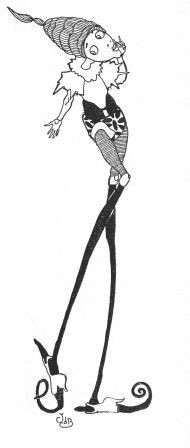 "But only look at our arms and legs"
"But only look at our arms and legs"
"Ah! I'd forgotten that detail," said the Dwarf.
"A detail!" cried several of the Rats. "A detail! But only look at our arms and legs."
"The Architect knew quite well," explained the first Rat, "that if the match fell on the liquid Soy it would become[Pg 118] hot immediately and everything would start to grow—and only look at our legs and arms!"
Smaly began to understand why it was that the Confectioner walked about on high pattens, and why the Rats wore boots. He saw that though all these people owed their pleasant life to Soy because it made everything grow without any trouble, yet they feared it, feared it even more than they feared the flies which used to come when they were asleep and eat the sugar of which their faces and hands were composed.
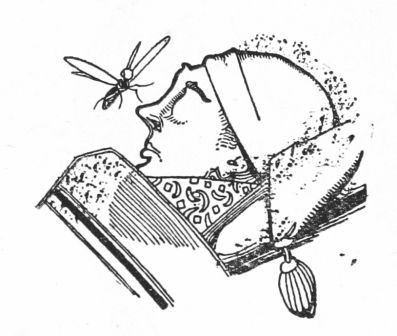 Even more than they feared the Flies
Even more than they feared the Flies
The Dwarf had pulled on a pair of boots without any soles, and placed a large pot of flowers on his head, and he now began to imitate the Rats watering the ground, affecting an extreme fear of wetting his feet, for it was because their boots had melted in the hot Soy that the Rats' paws had grown so long.
This imitation on the part of the Dwarf was interrupted by the sound of trumpets, for the Rats and the Wigs had already begun to recover from their emotion under the care of the Healer, and seizing hold of little trumpets of chocolate and sugar they had begun to blow upon them.[Pg 119]
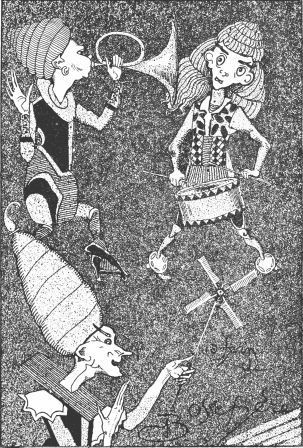 Rewards
Rewards
Some seized drums and violins and even bag-pipes, and it was impossible to say whether any one was speaking or not, the noise was so loud.
"Take away the mouthpieces and the violin strings," commanded the Chief Contractor.
"There aren't any," cried the Rats and the Wigs, hastily eating them all.
Then they continued to play their instruments; but these no longer made any noise.
The Healer was by now attending to the last of the victims. He had poured cordial into their mouths from the page's funnel, and they had all become absolutely drunk. Then he peeled off from their legs the strips of leather which had remained stuck to them, and cooled their little paws with pistachio-nut ice. When he had finished he took out from the sack labelled "Rewards" a little trumpet, a punchinello, a drum, and a paper windmill, and handed them round.
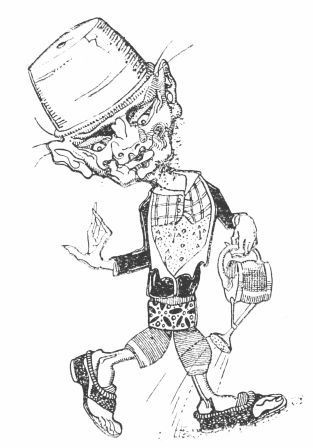 The Dwarf had pulled on a Pair of Boots
The Dwarf had pulled on a Pair of Boots
The Chief Contractor, however, refused[Pg 121] to allow the noise to begin again, and placing over his face a mask called "Calming Influences," he followed the Healer, and every time when the latter gave as a reward an instrument of music, the Chief Contractor ate it himself.
That night the Chief Contractor had a bad attack of indigestion, and it was the poor Confectioner, with his mended leg, who had to make the distribution of provisions.
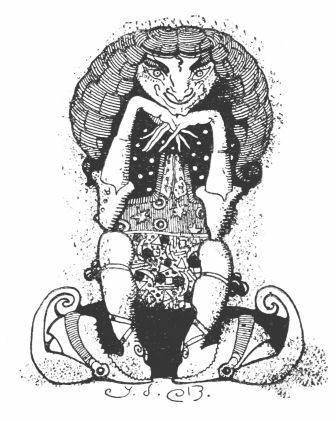
The young girls dance for the Rats, then play a curious game of tennis: They fail to understand Smaly's point of view.
The convalescent Rats all sat in a row upon a circular bench, still holding between their fingers the musical instruments which now lacked mouthpieces.
To distract their thoughts some charming young girls of the country, dressed in fine and beautifully embroidered stuffs, began to dance and juggle for their amusement.
Some of the dances were very complicated and elaborate; but some, on the other hand, were so simple that the performers had no need to exert themselves at all. They merely seated themselves upon the ground and sniffed luxuriously at jasmine and heliotrope blossoms. This dance was so simple that it was not necessary for there to be any dancers.
After several of these simple and extremely comfortable dances the Rats begged the young girls to play a game of tennis.
Accordingly eight of the most accomplished players arranged themselves about the court, and at each corner they placed two teacups to hold the balls.[Pg 123]
Thus there were eight teacups.
The court was divided by a rose-coloured ribbon.
Four players arranged themselves on either side of the ribbon, each standing behind the other.
The two leaders in each group held rackets made of vermicelli, while the two couples standing behind held rackets made of stretched parchment.
The game was about to begin.
Two accordion-players began to play a quadrille.
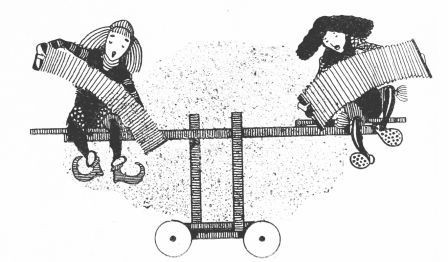 The Accordion-Players began
The Accordion-Players began
The Rats licked their chops and, pulling at their moustaches, strutted about full of joy.
Two chariots, filled with a pearly and transparent paste, were brought up, and several dancers taking long pipes began rapidly to make balls of it, and to blow them at the rackets; the paste seemed to be[Pg 124] of some sugary substance, and if they blew too hard the balls exploded without leaving so much as a trace.
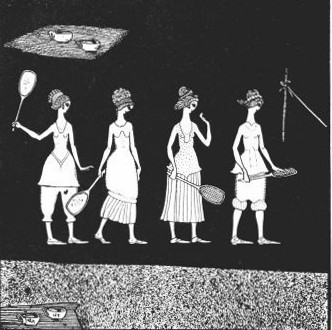 Tennis
Tennis
Several balls vanished in this way.
Then a pretty blue ball, spangled with gold, hit one of the vermicelli rackets. The ball went right[Pg 125] through the racket; but since it had lost velocity, it hung motionless in mid-air.
While the ball was hanging thus, the two players who had the rackets of parchment tossed up to decide which of the two should send the ball back.
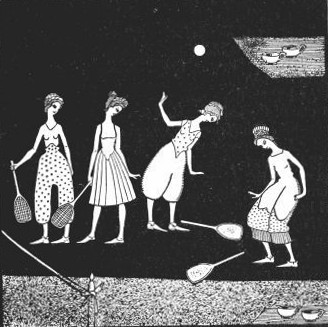 The Ball hung up thus
The Ball hung up thus
This fell to the part of the fair girl, who advanced with the stately steps of a quadrille, while the ball[Pg 126] hung awaiting her, and with one short stroke she hit it towards one of the teacups.
The ball rushed forward undeviatingly; but, as it neared the cup, its speed slackened so as not to break it. Finally it crept in as gently as a baby is put in a cradle.
"For you, Vera, for you," cried the fair girl who had hit the ball.
"Thank you, my love," replied she who had been called Vera.
And thus the game went on; whenever a girl hit one of the balls hanging in mid-air she cried out the name of the friend to whom she offered it.
By this ingenious method, without disputes or complications, the eight cups received each its ball, and when the game was over Vera took her ball, Dorothea hers, Simonetta hers, and so on, until each girl had her ball.
They then all embraced, and twining their arms about each other began to go back along the road down which they had arrived.
When they passed by Smaly, who was still standing at the door of the kitchen, he demanded:
"But who won?"
The young girls were quite unable to understand what this question meant. They smiled divinely at him with their delicately curved mouths, then each one showed him her ball made of pearly sugar.
The Mother of the Crow tells of the life and death of Djorak in his own country.
All this time Smaly and Redy had remained in the great kitchen. Suddenly they heard a voice say:
"It's confoundedly cold in this disgusting kitchen."
"Hullo, who is that?" asked Smaly and Redy together.
"It's I," replied the Mother of the Crow.
Peering about them they discovered her where she had been left forgotten under the table, still sitting in her oyster-shell.
"I'm cold," she said again.
"What can we do for you?" exclaimed Redy pityingly.
"Yes, how can we help?" asked Smaly.
"Take me back to my tree of coral."
"They won't let us go out of here," exclaimed Redy and Smaly.
"Then put the Tea-Cosy over me," suggested the poor old Mother of the Crow, whose teeth were chattering in her beak.
And so it was done.
There was no longer anything to see but a Tea-Cosy.[Pg 128] The Mother of the Crow was completely hidden.
"Now I'm nice and warm," said the Mother of the Crow.
It was really quite a new experience for Smaly and Redy to hold a conversation with a Tea-Cosy. The Mother of the Crow was a great chatterbox, and she knew a thing or two, and several things more after that.
"What are you doing here?" asked the Tea-Cosy.
Redy and Smaly folded their hands, and began:
"I know, I know," interrupted the Tea-Cosy, "but I meant what are you doing here in the great kitchen?"
"We're waiting for the sun to go down," was the response.
"And you can't leave till then," replied the Tea-Cosy. "Then tell me a story, a nice long story. I love long stories," added the Tea-Cosy with enthusiasm.
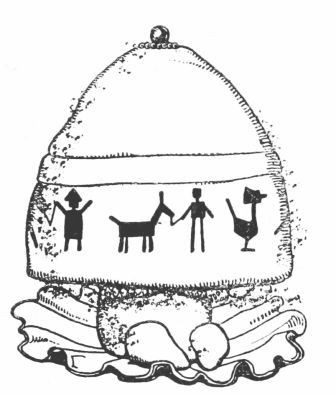 Tea-Cosy
Tea-Cosy
"Are you equally fond of telling long stories?" asked Redy and Smaly, both seized with the same idea.
"I like it even better than gooseberry-fool and candy-sugar caterpillars," replied the Tea-Cosy in a voice that trembled with excitement.
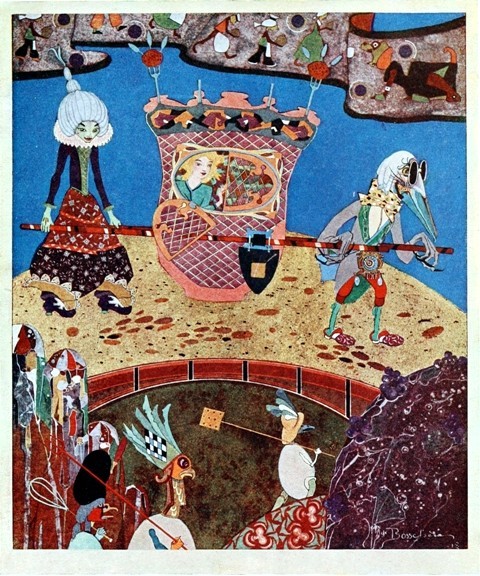 KISIKA IN HER SEDAN-CHAIR
KISIKA IN HER SEDAN-CHAIR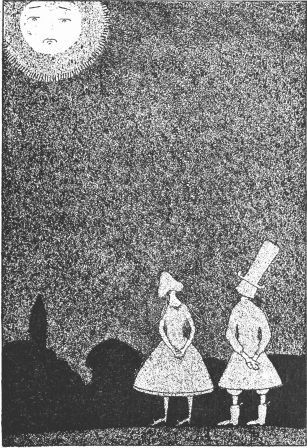 "We're waiting for the sun to go down"
"We're waiting for the sun to go down"
"Then," said Smaly, "tell us the whole history of the Prisoner."
"Ah," replied the Tea-Cosy, "the Historian has the monopoly of the local chronicles. We others can't even remember what happens in this country. But I can tell you what the Prisoner's life was like before he came here and was put in his sugar-cane prison."
"We know that they cut off his head," interrupted Smaly.
"Of course if you know all about it it's not worth while my telling you the story, it will be so short," said the Tea-Cosy huffily.
Smaly managed to soothe the Tea-Cosy, which then told them the following story:
"My story begins on a Saturday, which was also market-day. There was a great crowd in all the streets. The chariot where Djorak was seated with the Executioner could barely force a way through the mass of people. Every one who had the leisure to do so followed the chariot of the condemned; others, who had not, took the time out of their work, or their luncheon hour. Servants out shopping followed it with their laden baskets on their arms. Great ladies sent away their sedan-chairs so that they might fight their way on foot,[Pg 131] where no vehicles, however small, could have passed, so dense was the crowd.
"When he arrived at the scaffold Djorak sat down. He was a little pale, which is not to be wondered at, for it was enough to put any man out.
"The Executioner vested himself in his red robe, and taking out of his chariot a small grindstone he began to sharpen the pair of scissors with which he was going to cut off Djorak's head.
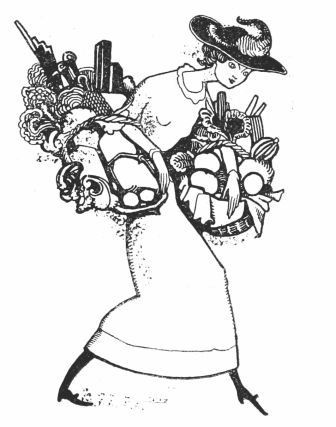 Servants out Shopping followed it with their Laden
Baskets on their Arms
Servants out Shopping followed it with their Laden
Baskets on their Arms
"The Prisoner, for his part, was so upset when he saw the scissors being sharpened that he neglected to respond to the farewell salutes of his friends, which they wafted to him across the barrier of policemen that surrounded the scaffold.
"It seemed to Djorak that he must be in a dream.
"Quite little things of no importance from every period of his life passed before the eyes of his imagination.[Pg 132]
"He found himself thinking of a hen that his parents had possessed when he was a very little boy. This hen had been extremely intelligent.
"One day she had found herself unable to break the shell of a snail, so she had gone to the stock-pot and taken out a lettuce-leaf. She came back, her bright eyes twinkling, laid the leaf down before the snail and hid herself.
"Presently the snail began to shoot out his horns.
"Then his head.
"Then his whole body.
"It was exactly what the hen had wished to see.
"The hen gazed at it.
"The hen laughed.
"The hen opened her beak.
"The hen gobbled the snail up.
"This and equally ridiculous happenings passed through the Prisoner's brain. He remembered his mother, and how she used thoughtfully to put an ash-tray in his pocket when——"
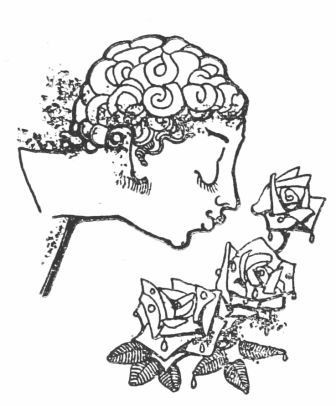 He thrust his Face into Roses covered with Dew
He thrust his Face into Roses covered with Dew
"We know all about the ash-tray," said Smaly and Redy together.
"Very well, very well, I'll leave out the ash-tray," said the Tea-Cosy. "But do you know also how when he wanted[Pg 133] his mother to do anything in particular for him, he thrust his face into roses covered with dew?"
"No, we don't know that."
"Well," continued the Tea-Cosy, "when he withdrew his face it would be covered with dew from the roses, and he would say to his mother:
"'Only look how I am crying....'
"Djorak thought of this and of a thousand other things. He had an excellent memory.
"Meanwhile the moment of his death was approaching.
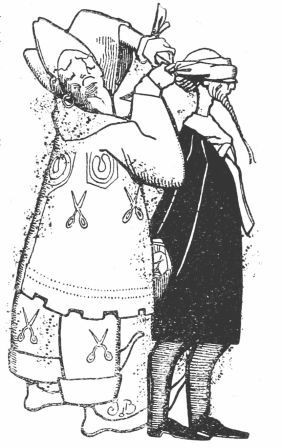 The Executioner bandaged his Eyes
The Executioner bandaged his Eyes
"The Executioner bandaged his eyes, then turned towards the crowd and, according to custom, demanded:
"'Has any one in this town any objection to the way in which I am about to employ this magnificent pair of scissors?'
"The Chief of Police answered, also according to custom: 'Have the scissors been sharpened according to rule?'
"The crowd merely cried out, 'Can they cut?'
"The Executioner thereupon took several old[Pg 134] newspapers and, holding them out before the crowd, began to cut them into fine strips. Next he took some old cardboard boxes, which he treated in the same way. Finally he cut up whole logs of wood into thin circles. In order that every one might see, he did these things in front of him, behind him, to the right and to the left.
"These experiments seemed to satisfy the crowd; but the Chief of Police still hesitated. Finally he approached the Executioner and, leaning forward, said in his ear:
"'Excuse me, I beg of you, my dear friend, if I seem indiscreet; but I am merely doing my duty. The King has particularly commanded that all the rules shall be observed. Therefore you will understand that I am bound to ask you three questions to assure myself that you really have the strength to use these scissors successfully.
"'1. Have you eaten three hard-boiled eggs this morning?
"'2. Have you eaten three rashers of bacon this morning?
"'3. Have you played a game of football this morning?'
"To each question the Executioner replied with a nod of the head.
"'Then get on with it,' said the Chief of Police.
"The Executioner raised the scissors towards the sky, turning himself about to all points of the compass. Then with a brisk movement he lowered the scissors, opened them and shut them again, and the head of Djorak tumbled to the ground."[Pg 135]
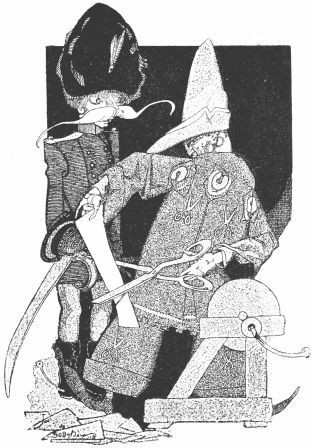 Next he took some Old Cardboard Boxes
Next he took some Old Cardboard Boxes
"But that's the same Djorak who is here in the prison of the sugar-canes," interrupted Smaly, who in spite of his habit of being astounded at nothing could not help showing a little astonishment.
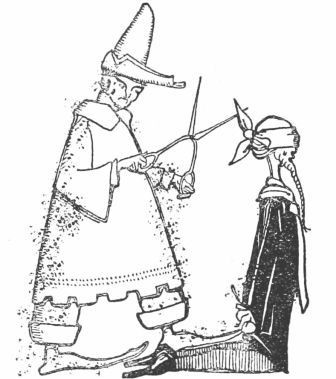 Opened them and shut them again
Opened them and shut them again
"Don't be so impatient," replied the Mother of the Crow imperturbably. "You'll understand in a moment or two. Now I have already told you that Djorak had a very good memory. At the moment when his head was falling he remembered that he had always heard one doesn't die immediately when one's head is cut off.
"It was extremely fortunate for him that he remembered this detail.
"He hastened to pick up his head, and he jumped off the scaffold holding it under his arm."
"Dear me," said Smaly and Redy.
The Mother of the Crow continued her story imperturbably:
"When the crowd saw this man in such a peculiar condition they began to fly in all directions. An indescribable panic followed. The square rapidly emptied. Soon there was no one left saving a few people who had been knocked down. The crowd[Pg 137] ran and ran; but the beheaded Prisoner ran harder still. Soon he was running by himself; all the townspeople had taken shelter.
"Djorak and his head had a very precise end in view in running thus. It was important both for the head and for Djorak to arrive as soon as possible at the house of a certain Magician whom he knew.
"He arrived, rushed in and banged the door behind him. The Magician, unfortunately, was out, only his young son was there, and although this youth understood perfectly how urgent it was that Djorak's head should be fastened on again as soon as possible, he could do nothing to help him.
"'Let's consult the Brindled Rabbit,' suggested the Head.
"The Brindled Rabbit being questioned played several strains on a harp of silver and crystal, then he withdrew into an old comfit-box and shut the lid down on himself.
"After a few seconds he opened the lid again, his eye became visible, and his little paw shoved a folded slip of paper through the opening.
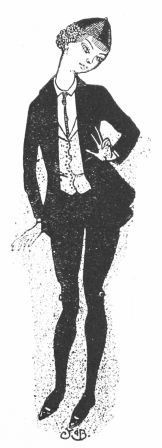 His Young Son was there
His Young Son was there
"The Son of the Magician read as follows:
"1 Three.
"2 Three.[Pg 138]
"3 Three.
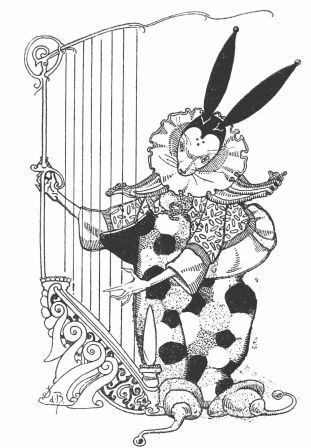 The Brindled Rabbit
The Brindled Rabbit
"He at once tore up to the third story of the house. There he counted three shelves, and from the third shelf he took the third little bottle and ran downstairs again.[Pg 139]
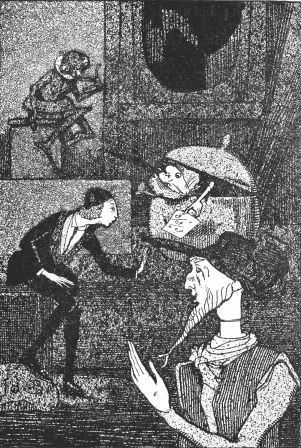 His Little Paw shoved a Folded Slip of Paper through the
Opening
His Little Paw shoved a Folded Slip of Paper through the
Opening
"'What must he do with it?' asked the youth, of the Rabbit; but the box remained shut; there was no answer.
"'I must drink it,' replied the Head.
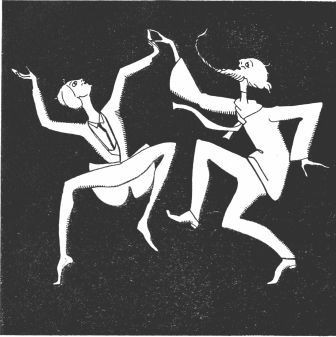 Then they sang a Comic Duet
Then they sang a Comic Duet
"'But you've no stomach,' cried the Son of the Magician.
"'Put my head back on my neck,' suggested Djorak, 'then there will at least be a stomach beneath my head.'[Pg 141]
"The Son of the Magician at once placed Djorak's head back in its proper place with one hand, while with the other he tipped the little bottle between its lips.
"The effect was immediate.
"Directly the liquor trickled down his throat Djorak felt himself as well as ever. He danced about with joy. He even played a game of leapfrog with the Son of the Magician, then they sang a comic duet, of which I cannot remember the words. The first lines went something like this:
"But Djorak had a good memory, and so he had kept his head.
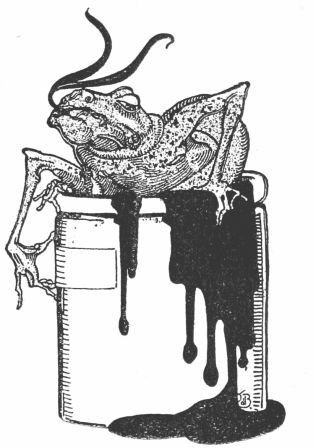 Then they questioned a Black Toad
Then they questioned a Black Toad
"During their song the Brindled Rabbit crept out of his comfit-box. He could not stay in it for laughing at the comic song.
"Djorak and the Son of the Magician begged him to advise them what to do next; but the Rabbit only held its sides with laughter, and made no reply.
"Then they questioned a Black Toad who came[Pg 142] crawling out of a pot of treacle where he lived, and began to lick himself dry with a fine, forked tongue.
"The Rabbit hopped up to him wishing to share in the treacle; but the Black Toad flew into a rage. It was a worse rage than even that of the Chief Contractor when we have not placed ourselves symmetrically," added the Mother of the Crow, remembering that Smaly and Redy had seen the Contractor in a temper.
"Then," she continued, "the Son of the Magician asked the Black Toad in what country Djorak should take refuge, making the suggestion that they should send him to a green country where the clouds were all white and the trees mauve.
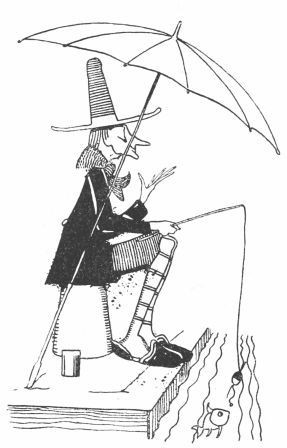 And fish in the Little River in the Afternoon
And fish in the Little River in the Afternoon
"The Black Toad shot forward to within an inch of the Rabbit's nose; but without advancing a step, for his legs suddenly expanded to allow him to do so.
"'I hate mauve and white,' he snapped, and shot back again.[Pg 143]
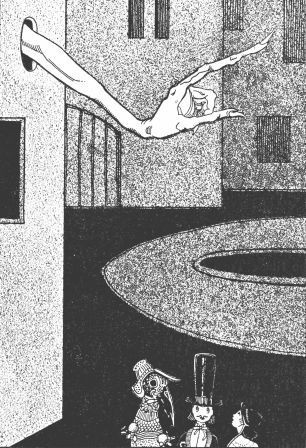 The Thin Long Arm of the Historian
The Thin Long Arm of the Historian
"The Rabbit replied peacefully, 'How about a rose-coloured country, where the people dance as they bake the bread?'
"'I would like that,' said Djorak.
"'I don't doubt it,' said the Brindled Rabbit.
"'Or would you like a country where they hunt butterflies all the morning, and fish in the little river in the afternoon?' asked the Rabbit.
"'Yes, yes, that will do,' replied Djorak, who was anxious to get away.
"'He is a misanthrope,' declared the Toad, retreating towards its pot of treacle.
"'Oh, kind Toad, do tell me where I ought to go,' begged Djorak.
"'Get into this little glass tube,' replied the Toad.
"Djorak obeyed.
"This tube was no bigger than a penholder; when Djorak was comfortably settled inside of it the Black Toad put one end of it into his mouth and blew.
"He blew so hard that Djorak was shot right into our country. Then——"
But here Redy interrupted the Mother of the Crow. She gave a little shake to the Tea-Cosy and whispered rapidly what she had noticed taking place on the other side of the public square.
This is what she had seen.
From one of the holes made for the Flying-Fish Redy perceived the thin long arm of the Historian sticking out, the finger pointing accusingly towards the door of the kitchen, where Smaly, Redy, and the Mother of the Crow were seated.[Pg 145]
The Mother of the Crow understood the significance of this at once. It meant she would not be permitted to carry her story any further. The monopoly of the chronicles of the country belonged to the Historian.
The Mother of the Crow had to hold her tongue.
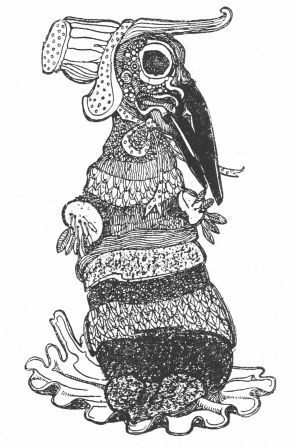
Smaly and Redy are taken to see the Fleet: The Prisoner arrives and the Wigs fly in terror: Smaly and Redy at last have speech with the Prisoner.
At this moment a crowd of Wigs ran in at the door crying:
"The fleet has arrived, the fleet has arrived."
"The fleet?" asked Smaly. "I haven't seen any sea."
"There isn't any sea, or any water in the river," replied the Mother of the Crow.
"Do you imagine," demanded the Young Stork, "that a nation like ours is going to deprive itself of the splendid luxury of a fleet simply because chance has decreed that the ocean should not come as far as its frontiers?"
"Besides, a fleet's so ornamental," said the Mother of the Crow.
"Oh, you're there, are you?" said the Young Stork. "I have been asked to beg you to assist at the grand inauguration ceremony of the fleet."
Smaly and Redy begged the Young Stork to allow them to accompany him.
The Stork, who was always charitably employed at the task of extracting fish-bones from the back of the Despoiler, and so was accustomed to doing[Pg 147] kindnesses, promised to beg for this favour for them from the Chief Contractor. Then the Stork departed, taking with him the Mother of the Crow, huddled up in her oyster-shell.
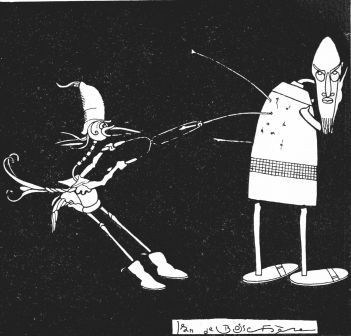 Extracting Fish-bones from the Back of the Despoiler
Extracting Fish-bones from the Back of the Despoiler
After a quarter of an hour four more Wigs arrived in the kitchen; dangling from a long stick, they bore a large copper cauldron.[Pg 148]
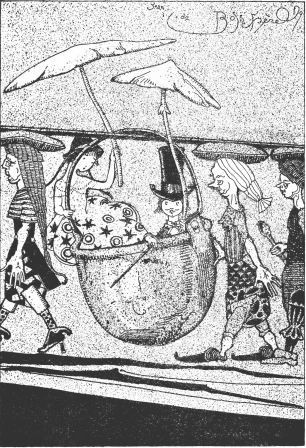 They bore a Large Copper Cauldron
They bore a Large Copper Cauldron
"It is permitted that you should assist at the ceremony," they announced to Smaly and Redy. "Get into the pot."
Smaly and Redy climbed in, full of joy, and Smaly whispered low to his little wife, "They are still afraid that the sun will melt us, and that we shall cover their beautiful lawn with grease."
"Take this umbrella," continued the Wig who was the spokesman, offering them a mushroom. "This will protect you from the hot rays of the sun; and whatever you do don't lean over the edge of the cauldron."
Then they set off.
The fleet was already arranged upon a long platform painted blue. The vessels were made of pink and white marzipan, and all had two masts of cane and little silken flags. A funnel of gilt paper was placed in the middle of each ship.
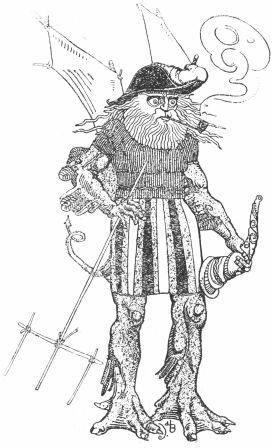 The Admiral was a Triton
The Admiral was a Triton
"But there's no smoke coming out of the funnels," objected Smaly.
"I know, I know," replied the Chief Contractor impatiently, and turning he ordered: "Admiral, put the smoke in place," and the Admiral at once arranged a charming little puff of smoke made of cotton-wool at the top of each of the forty funnels.
The Admiral was a Triton, whom the Wigs had made themselves. They had set their heart on possessing this little animal; but since they had no sea from which to catch one, they had done their best to model one from an authentic picture.
The Triton was made of barley-sugar and almond paste.
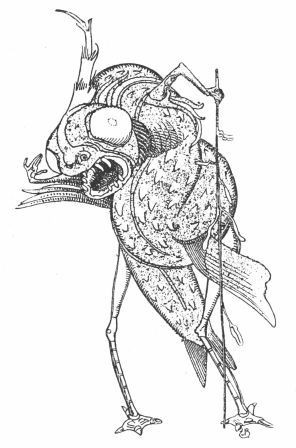 The White Dolphin with Pink Eyes
The White Dolphin with Pink Eyes
The other personages who had arrived with the fleet were the White Dolphin with pink eyes, and a young but very despondent Syren, a black Sea-Dog, and a large Sea-Horse, which seemed almost mad; also an extremely curious fish, which brought its own food in a glass jar.
All these creatures had asked nothing better than to leave the sea, which had become unbearable[Pg 151] for them during the past few years because of the submarines. All of them were very happy at the chance of obtaining employment in a country as solid and sweet as that of the Wigs. Their business here would be to look after the fleet. Already they knew all the ships quite well by sight, and that was all that was needed.
The Chief Contractor placed over his face the "Master-Mask," and held out his hand, which held one of the long bamboo spoons.
He announced in a solemn voice:
"We, the Chief Contractor and the Wigs, declare the fleet of our country to consist of forty ships, here drawn up in line, and the Triton is declared by us to be Admiral, Painter, Rope-maker, and Sugar-repairer. So be it."
"So be it, and long live the marzipan fleet," cried all the citizens, who had never seen the sea.
"Is there really no water anywhere?" asked Smaly a little indiscreetly.
The Chief Contractor leant towards Smaly, who was still sitting in his cauldron, and whispered low in his ear:
"Tell the truth, do you really think that that fleet needs any water?"
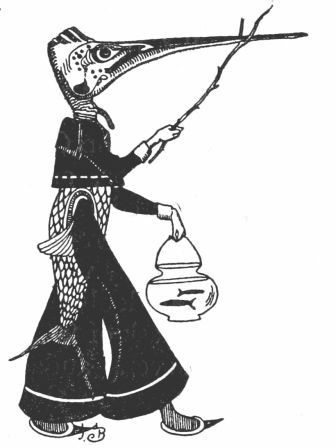 An Extremely Curious Fish
An Extremely Curious Fish
"I am certain of it," replied Smaly imperturbably, leaning over the edge of the cauldron towards the Chief Contractor, whereupon the Stork gently pushed him back again.
The Chief Contractor was in a great state of consternation and stood gazing from one to the other of the important officials of the Wig Republic as though for assistance, while even the crowd began uneasily to feel the effect of his dismay.
Suddenly the Chief Contractor noticed that the eye slung round the neck of the Crow was winking at him to approach. He accordingly went towards the Mother of the Crow, who spoke into his ear.
Beneath his mask the Chief Contractor's mouth began to smile. Quickly putting on the mask of "Good-Humour," he announced:
"A band of our Rats will each morning copiously water our fleet, for, believe me, no fleet is quite complete without water."
Here the Crow took two steps towards the Chief Contractor, and putting on his ebony spectacles, whispered a few words to him. The Chief Contractor thereupon added in a loud voice:
"They will not use the water of Soy."
Suddenly he perceived it was necessary to change the mask of "Good-Humour" for that of "Anger," for several audacious Wigs were busy writing their names upon the hulls of the white ships; but he had no time to give vent to his just indignation, for upon all sides the well-known cry arose:
"The prison is coming, the prison is coming."[Pg 153]
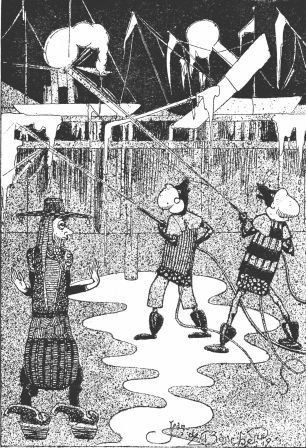 "A band of our rats will each morning copiously water our
fleet"
"A band of our rats will each morning copiously water our
fleet"
There was no doubt about it; the Prisoner must have heard the enthusiastic shouts of the crowd, and in his mad rage was now bearing down upon the fleet. Some of the bravest Wigs managed to save a few ships, many more were weeping; but the largest number did not wait to see what was happening, but took to their heels.
Soon Smaly and Redy were almost alone in their cauldron. The forest of sugar-canes was arriving, preceded by the little army of Rats with watering-cans.
When the Prisoner was near enough to hear them, Smaly and Redy cried out:
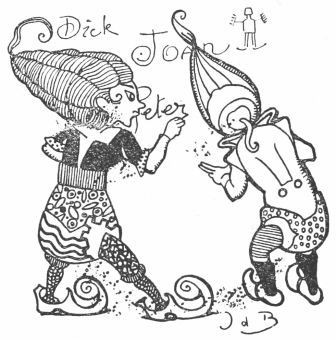 Wigs were busy writing their Names
Wigs were busy writing their Names
"Djorak, Djorak, stop a minute."
When he heard real voices, human voices, Djorak paused. His rage fell from him like a cloak.
"Djorak, Djorak."
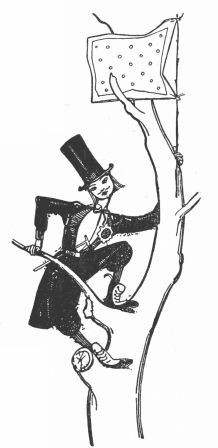 A Red Flag
A Red Flag
"Who calls my name?" asked the Prisoner in a husky voice, a voice which had not been used for many years.
"It's Smaly and Redy who call you. We want to help you," added Redy.
When he heard a woman's voice Djorak's thoughts flew to the three daughters he had lost, and his[Pg 155] madness fell away from him. He drew nearer to the two little people by breaking the sugar-canes in front of him. They could now see him, and he could see them. The Rats lay down to rest, so no new sugar-canes sprang up to bar the way.
"Will you save me?" demanded Djorak.
"It will be the first thing we shall think of when we are allowed out of this cauldron."
"Cauldron?" repeated the Prisoner. "Cauldron? And when will you be allowed out of it?"
"When the sun goes down," cried Redy; "and we will give you back your daughters."
In his profound joy Djorak all but lost consciousness.
"But while we're waiting," remarked Smaly, "tell us how came it about that you were put in this prison."
But Redy interrupted to say, "First let's agree on a place where we can all meet, and what sign we shall tell it by."
So they arranged that the Prisoner should turn his prison in the direction of a red flag, which Smaly would tie to a tree near the frontier.[Pg 156]
"I was hurled into this country," said the Prisoner, "by the powerful breath of a Black Toad. At first I was not at all badly received. I was able to render several services to the Wigs, and was especially useful to them in building their walls of gingerbread.
"Unfortunately, however, the Chief Contractor is a fool. Without his idiotic conceit this country would be happy and prosperous, but you have undoubtedly seen for yourself what a ridiculous creature he is. Only to give you one instance, I will tell you what happened that made him put me in this prison of sugar-canes.
"One day some feather-headed person or other began describing a bridge to him. The Chief Contractor insisted on having the nature of a bridge fully explained to him, and next day he caused a canal to be dug right across the middle of the country; but all the water that they poured into it disappeared at once, for it soaked away through the soil of sugar and flour.
"However, in spite of the fact that there was no water in the canal, he caused the bridge of nougat to be built across it; the bridge which I have destroyed a hundred times passing over it in my prison.[Pg 157]
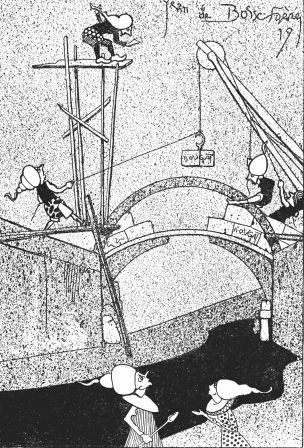 "I have destroyed a hundred times passing over it in my
prison"
"I have destroyed a hundred times passing over it in my
prison"
"It was forbidden under the most heavy penalties to cross the canal, although it was dry, by any other means than by way of the bridge. I had to conform to this stupid law, in spite of the fact that the nougat cracked beneath my feet each time I crossed the bridge.
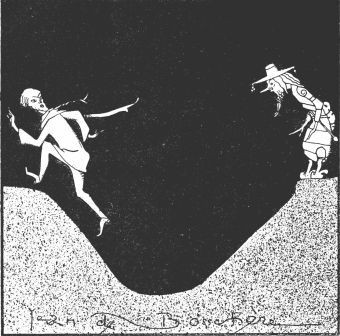 "I was caught stepping right over their silly old dry
canal with one stride"
"I was caught stepping right over their silly old dry
canal with one stride"
"However, one evening I was caught stepping right over their silly old dry canal with one stride.[Pg 159]
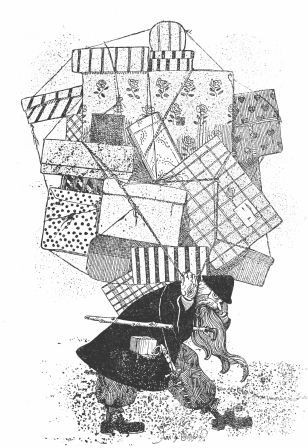 The Manufacturer of Cardboard Boxes
The Manufacturer of Cardboard Boxes
"The Despoiler's rage, although he hid it from me, was deep and terrible. Doubtless that very evening my doom was agreed upon, for the next morning when I awoke I was surrounded by this barrier of sugar-canes," and the Prisoner wrung his hands and seemed in an impotent rage. He went on jumping up and down, and gesticulating, for his madness had caught him again.
Once more he began to break the sugar-canes in his frenzy.
At that moment Smaly and Redy saw the Despoiler pass by, followed by the Young Stork, carrying a pair of nippers.
They were on their way to a secret meeting with the Manufacturer of Cardboard Boxes.
The Despoiler seemed to be literally shaking with anger. The Young Stork had been forced to tell him that he stood in urgent need of certain repairs to his back, and the Despoiler, therefore, found himself in the humiliating situation of having to make a purchase from the Manufacturer of Cardboard Boxes.
It added to the Despoiler's vexation to have been seen by the two little humans. He stopped and looked at the sun, of which only a small piece of the rim was visible.
The Despoiler turned towards the Rats and, pointing to the cauldron, called out angrily:
"Take that and run with it to the frontier and empty it out there."
And thus it was done.
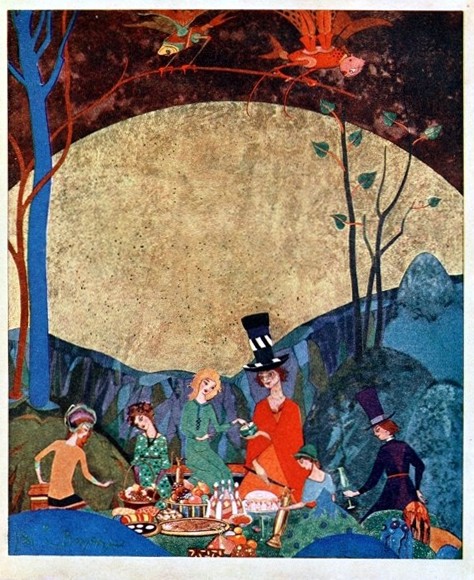 THE PICNIC WHICH FOLLOWED WAS AN UNFORGETTABLE REPAST
THE PICNIC WHICH FOLLOWED WAS AN UNFORGETTABLE REPASTThe three daughters of the Prisoner are installed in their gardens.
So Smaly and Redy found themselves on the frontier of the Wigs' country. They were so tired from having seen and done so many things during the day that hardly had they arrived than they fell sound asleep amid the myrtle-bushes which grew between the rocks.
When they awoke they perceived just within the frontier (which was indicated by boundary stones made of sugar-candy) the three gardens that had been prepared for the daughters of the Prisoner.
"The Wigs keep their word anyway," said Smaly and Redy to each other, as they rubbed their eyes; then they looked at each other and saw that their beaks had disappeared.
You may imagine how happy this made them! Never would they have dared to return to their own village with those enormous beaks stuck in the middle of their faces, even though they were invisible to all save the birds and each other.
They stood up and held hands, and to attract the attention of the Wigs began to chant:
But a sentinel who looked like a dragon-fly, and[Pg 162] carried a lantern and a megaphone, shouted to them to be silent.
The Confectioner, who was busy giving the final directions to the gardeners, struck an attitude and recited:
"We know all about that," said Smaly and Redy together.
"What do you know?" asked the Confectioner suspiciously.
"How funny you all are," answered Smaly.
"At least we are not made of grease and suet," retorted the Confectioner in a tone of mingled pride and disgust.
The gardens were arranged after the same principle as the windows in the house of the Historian. They were not really separated by walls; but since one speaks with one's mouth and sees with one's eyes, there was at about the height where the young girls' faces would be a plank of nougat separating the gardens, and since it was certain that sometimes the girls would sit down, there was another plank a little lower.
There were altogether four planks, for as the[Pg 163] three girls were of different ages and heights, the planks which would have prevented one girl from seeing her neighbour would not have prevented the next.
How ingenious this was! It was as well thought out as the two openings for the Flying-Fish in the ceiling of the Historian's house, a big one for the big fish, and a smaller one for the smaller fish!
In these gardens the lawns were made of angelica, and the flower-beds of jam tarts, and at the end of each garden there was a little house to sleep in at night, or in the heat of the afternoon.
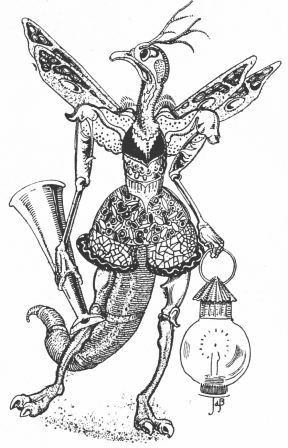 A Sentinel who looked like a Dragon-Fly
A Sentinel who looked like a Dragon-Fly
When all was ready the three daughters of the Prisoner were led in. The ceremony was extremely simple. Mistigris was the first to arrive, and touching his lips with his ring, he thus addressed the two little people perched upon their rock.[Pg 164]
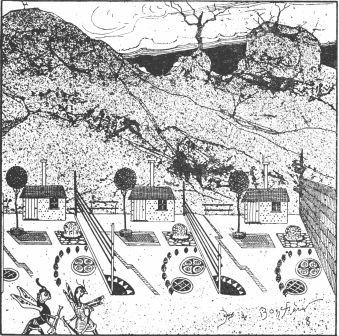 The Gardens were arranged after the Same Principle as the
Windows in the House of the Historian
The Gardens were arranged after the Same Principle as the
Windows in the House of the Historian
"You are now about to see the three girls; but whatever you do don't forget they are ignorant of the history of their father, our prisoner. They were sent here by a certain Black Toad, the same creature who blew Djorak into our country. This Toad made out that it was doing a very charitable action, and upon a label round the neck of each young girl he[Pg 165] had written their names and tastes. On the first label was: 'Number I, Kisika Djorak. Blue eyes, amiable disposition, fond of marrowfat peas and of getting up late.' On the second label was: 'Number II, Laptitza Djorak. Brown eyes, devoted to cherry tartlets and cheese soufflé. Gazes at the stars and dreams about a Prince Charming.' And on the third label: 'Number III, Fritilla Djorak. Green eyes, adores fruit, particularly tangerine oranges and nectarines. Dreams as much as Number II; but has very modern notions as well.'"
When Mistigris had finished reading out the labels a large sedan-chair appeared, carried by several Wigs, among them Papylick and the Young Stork. The door of the chair opened and Kisika stepped into the first garden.
Kisika certainly had beautiful blue eyes, soft hair, and a pink-and-white skin. She was so beautiful that one would have taken her for a picture rather than for a real girl.
The next person to arrive was the Despoiler, who wished to make sure for himself that the planks were at the right height before he permitted Papylick to approach with the second sedan-chair.
The young girls had not lived in these chairs, they were simply carried from place to place in them.
Kisika had lived in the house of the Crow.
Laptitza, who was now brought into the second[Pg 166] garden, had lived in the house of Papylick. Laptitza also was very beautiful, with a pale skin and eyes like a deer.
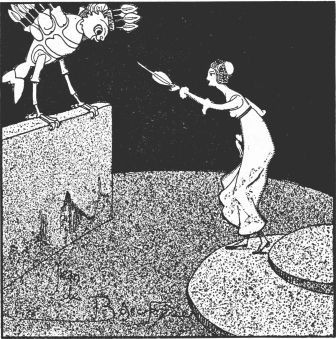 A Little Red Feather, which she had picked up in the
Market-Place
A Little Red Feather, which she had picked up in the
Market-Place
Every one now awaited the arrival of Fritilla, the third daughter; but when she stepped out of her sedan-chair she beckoned to the Flying-Fish, who[Pg 167] had been pursuing her for some days past, and handed it a little red feather, which she had picked up in the market-place. This feather was of great importance to the Flying-Fish, which thanked Fritilla many times and swore to serve her always. Then Fritilla was led into the garden. She had yellow hair and green eyes, and her beauty seemed at first a little sad and cold; but on looking into her eyes you saw that they were at once tender and ardent.
When the three girls were installed in their gardens of angelica and jam tarts the Wigs arranged themselves in a long line. Then the little door that led into Kisika's garden was opened, and the Chief Contractor, placing over his face the mask called "Stoic Melancholy," approached her and said:
"Kisika, farewell. I beg you to accept this large pot of Soy in memory of me. There's enough to last you all your life."
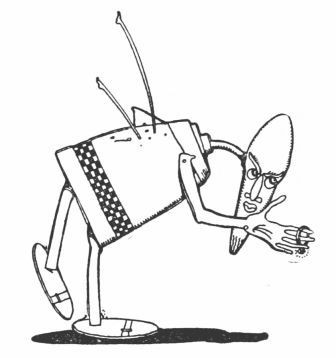 Next the Despoiler Approached
Next the Despoiler Approached
Next the Despoiler approached, followed by the Young Stork.
"Farewell, Kisika," he said. "I make you a present of this ring, which will enable your voice to carry to great distances, and will also stop all tiresome and needless voices of others."
The Confectioner next came forward and said,[Pg 168] "Farewell, Kisika, my present is two bamboo spoons and two knives. Be happy in your garden; it's made of the best confectionery."
The Crow, putting on his spectacles, said, "Farewell, Kisika, I beg that you will accept these spectacle-lenses in memory of me. They are made of solid ebony, and some day when you have reflected enough on life you will have them mounted on glass rims and will always put them on before you speak. Farewell."
The Historian's gift consisted of six hard-boiled eggs, which he handed to Kisika, saying, "Accept my humble offering, Kisika. These eggs are home-made. Myself, I never eat anything else."
Mistigris said, "Farewell, Kisika, take this little bow and arrow made of fish-bones. Perhaps it will amuse you to play with them."
And the Young Stork added quickly, "Adieu, Kisika, take this pair of pincers to pluck from your heart the darts which may lodge in it."
The wife of the Chief Contractor presented Kisika with a beautiful fan made of paper lace; and the Healer gave her a little sugar trumpet, of which the mouthpiece was this time intact.
The Dwarf with the big head gave her a little watering-can to drink out of during the summer.
All the crews of the marzipan fleet, and the Rats, came in their turn to offer each a little souvenir.
Presently there was such an immense crowd that it seemed as though the ceremony must go on for days,[Pg 169] since the same things had to be repeated three times, once before each garden.
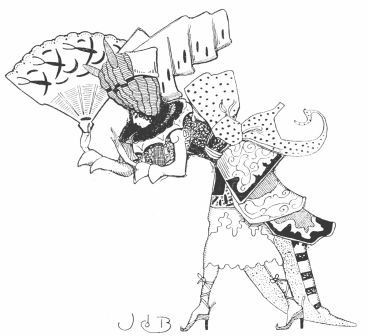 The Wife of the Chief Contractor presented Kisika with a
Beautiful Fan made of Paper Lace
The Wife of the Chief Contractor presented Kisika with a
Beautiful Fan made of Paper Lace
Every one was there.
The Grasshoppers.
The Birds with hats.
The Worms with spectacles.
The Sponges with shining eyes.
The Pigs from the great kitchen.
The Flying-Fish and Lizards.
The Dancers who had played at tennis.
The Accordion-Players.
In the end it would have needed pantechnicons to move all the presents. When the ceremony was over the Wigs departed in a long procession, singing in their sweet voices:
Smaly and Redy effect the rescue of the three young girls: Djorak joins them and they all partake of a delightful picnic: Smaly blows the Soy powder over the country of the Wigs: Then the six friends go home.
Smaly and Redy had been watching with all their eyes, and they observed that two sentinels, instead of taking their departure with the crowd, stayed behind to guard the three sides of the garden which were in the country of the Wigs. The fourth side gave upon the frontier and was marked off by a long ridge of rock, several feet in height. It was from this rock that Smaly and Redy sat looking into the gardens. They could have already spoken to the three girls, but Smaly advised that they should wait until the time of the next siesta had arrived.
From their rock Smaly and Redy could see quite clearly the roof of the Historian's house. Directly they saw the Flying-Fish enter to announce the time for siesta Smaly meant to speak to the young girls.
"Let us hang our red flag up there," said Redy to Smaly, pointing to an old tree.[Pg 171]
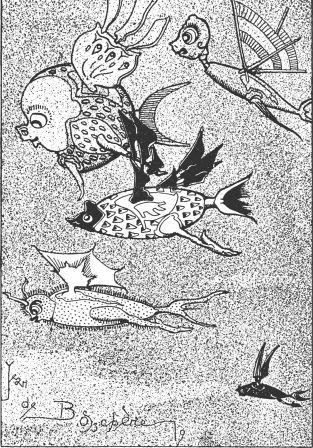 Directly they saw the Flying-Fish enter
Directly they saw the Flying-Fish enter
"Are you managing affairs or am I?" demanded Smaly severely. "Nevertheless," he added more kindly, "I will consider any advice you have to give, and may follow it ... if it is good...."
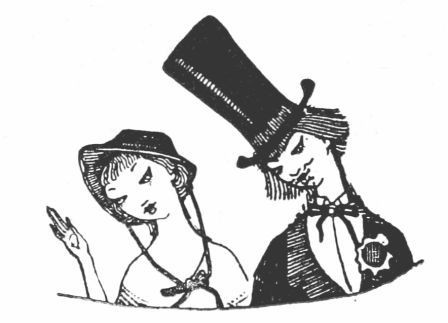 Their Two Little Heads appeared Side by Side
Their Two Little Heads appeared Side by Side
Now the Flying-Fish began to fly low over the town, and two of them entered the house of the Historian.
The whole country slept. It was evident that even the two sentinels slept heavily.
When Smaly and Redy were sure that all was safe, they crept forward to the edge of the rock. Their two little heads appeared side by side before the astonished eyes of the three young girls, and since their beaks had disappeared for good and all, the two little people were certain they would make a good impression. And, indeed, the three young girls saw at once that these were the heads of human beings, real human beings, not creatures made of sugar and cake.
When they heard these two human beings speak, the young girls were seized with intense emotion. Smaly and Redy whispered:
"We've come to save you."
Kisika, Laptitza, and Fritilla held up their arms towards them, while the tears ran down their cheeks for joy. They all began to speak at once; but Smaly[Pg 173] and Redy each placed a finger on their lips with a mysterious air, to command silence.
"We are going to take you away with us," whispered Redy.
"Silence," said Smaly, standing on the point of his toes to appear taller. And he continued, "No one must speak until Kisika, Laptitza, and Fritilla have each made a little stairway by which they can climb up to where we are."
"What a splendid idea," cried Redy.
Smaly took no notice of her; but said, with an air of great importance, "Let the young girls begin at once to make the stairways."
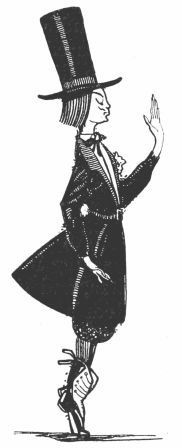 Smaly standing; on the Point of his Toes
Smaly standing; on the Point of his Toes
So during three days the young girls were busy making the stairs by which they would mount to freedom. During the siesta on the third day Smaly and Redy made trial of these stairs and found them perfectly firm. It was then that Smaly climbed into the dead tree which Redy had pointed out to him, and tied to it the big red handkerchief which was to be the signal to Djorak.
Smaly and Redy were both of them certain that Djorak was in his right mind once more, for during the three days the sugar-cane prison had not[Pg 174] budged; but stayed still as if awaiting their signal, and directly the red flag fluttered in the breeze Redy cried out:
"Look, look, the prison is coming."
"Of course it is," said Smaly, as though he had never had any doubts.
And indeed the prison was rushing furiously towards them.
Smaly stayed up in the tree to watch, but Redy had her attention distracted by the Red Flying-Fish, which was sitting watching her.
Suddenly the fish flew away; but it soon reappeared followed by a great flock of other fish. Each fish carried something good, tarts or cakes or fruits. The Red Flying-Fish carried a large hat and mantle in its claws. The fish all deposited their offerings at the feet of Redy, and from his tree Smaly looked on with great pleasure.
Towards evening the forest of sugar-canes came crashing into the three little gardens. Kisika, Laptitza, and Fritilla ran up their stairways and fell into Redy's arms; but Smaly was not going to waste any time on sentiment, to which he felt he could give way later. He ran down the centre staircase, seized one of the boxes of Soy which the Chief Contractor had given to the young girls, presented the other two to Djorak, and then, without waiting to listen to the Prisoner's exclamations of joy, bade him follow him.[Pg 175]
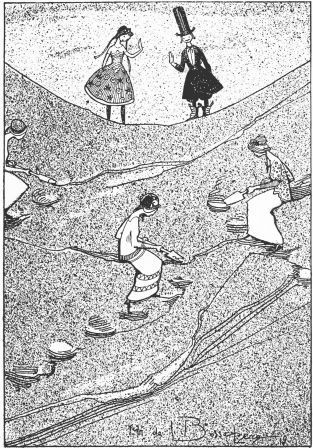 So during Three Days the Young Girls were busy making the
Stairs
So during Three Days the Young Girls were busy making the
Stairs
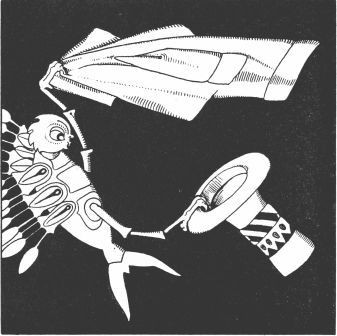 The Red Flying-Fish carried a Large Hat and Mantle in its
Claws
The Red Flying-Fish carried a Large Hat and Mantle in its
Claws
He sat the Prisoner down on a rock and drew out of his pocket a pair of scissors and cut his wild and streaming hair, and then proceeded to shave his beard, which was no less long. Then both of them, carrying as many of the presents as they could, joined Redy and the three young girls.
The emotion of this father on meeting once again his three daughters was a very moving spectacle. Djorak, who had such a good memory, could not forget that he had been beheaded, and that without his own great presence of mind and the wise counsels of the Brindled Rabbit, he would never have seen his daughters any more.
The picnic which followed was an unforgettable repast. Djorak looked very presentable in the hat and cloak brought by the grateful Flying-Fish.
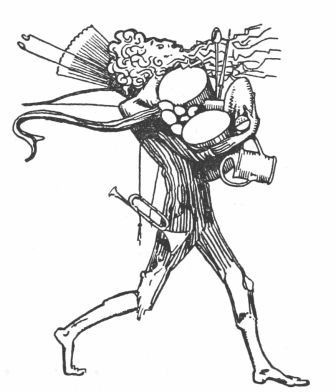 Carrying as many of the Presents as they could
Carrying as many of the Presents as they could
In the first place every one was filled with joy, and in the second the three young girls had been brought up in the Wig country thoroughly to appreciate the most delicious pastries ever made. They soon discovered that the Soy powder was no longer of any use to them, for its magic properties failed once it was over the borders of the Wig country, in the same way that the Wigs themselves would have melted away directly they passed the frontier. Therefore the six happy people seated amidst the fragrant heather and myrtle began to ask what use Smaly meant to make of the three big boxes of Soy.
"Patience," was all Smaly would reply when he was questioned, and they had to have patience until the evening, when a south-east wind sprang up.
Smaly took the first box and threw the contents into the air. The wind took the powder and blew it over the town of the Wigs; and this Smaly did with the other two boxes as well.
"What is going to happen next?" asked Redy.
Smaly pointed to some clouds which were piling up, and replied sententiously, "Rain."
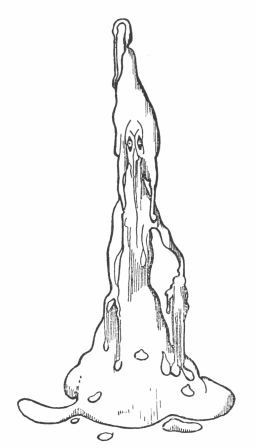 Wigs themselves would have melted away directly they
passed the Frontier
Wigs themselves would have melted away directly they
passed the Frontier
And indeed the rain began to fall. The Soy powder mingling with the water had a magical effect, the effect that Smaly had hoped for; the whole country began to sprout, trees, houses, grass, walls, lawns, everything began to grow and grow, just as the sugar-cane prison had done when the Rats watered it with the liquid from the reservoir of Soy.
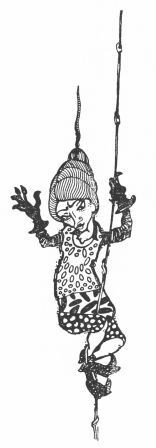 They hung out of the Windows
They hung out of the Windows
As the six happy friends started out on their journey they could see, by looking behind them, the houses and plants growing and growing. The Wigs were evidently in a terrible state of alarm. They called frantically to each other, they hung out of[Pg 179] the windows, they descended by long ropes into the streets. It was the most tremendous day in the history of the Wig country; but there were no casualties, and when the Confectioner had built another flight to their staircases, they were just as happy in their tall houses as they had been when they lived in those of two stories. It was a little more tiring for them to have to climb so high, but then what a splendid view they had into each other's attics!
As to Smaly and Redy, once more returned to the world of men and women like ourselves, they installed Kisika, Laptitza, and Fritilla in the three little bedrooms prepared for them before ever the quest began.
Djorak, completely cured of his madness, slept in a delightful little pavilion in the garden, but took his meals with the family.
And they all lived happily ever after. I myself can quite well remember meeting them last springs taking their morning walk in the park of their town.
And what a charming sight they were to be sure!
***END OF THE PROJECT GUTENBERG EBOOK THE CITY CURIOUS***
******* This file should be named 32406-h.txt or 32406-h.zip *******
This and all associated files of various formats will be found in:
http://www.gutenberg.org/3/2/4/0/32406
Updated editions will replace the previous one--the old editions will be renamed.
Creating the works from public domain print editions means that no one owns a United States copyright in these works, so the Foundation (and you!) can copy and distribute it in the United States without permission and without paying copyright royalties. Special rules, set forth in the General Terms of Use part of this license, apply to copying and distributing Project Gutenberg-tm electronic works to protect the PROJECT GUTENBERG-tm concept and trademark. Project Gutenberg is a registered trademark, and may not be used if you charge for the eBooks, unless you receive specific permission. If you do not charge anything for copies of this eBook, complying with the rules is very easy. You may use this eBook for nearly any purpose such as creation of derivative works, reports, performances and research. They may be modified and printed and given away--you may do practically ANYTHING with public domain eBooks. Redistribution is subject to the trademark license, especially commercial redistribution.
*** START: FULL LICENSE ***
THE FULL PROJECT GUTENBERG LICENSE
PLEASE READ THIS BEFORE YOU DISTRIBUTE OR USE THIS WORK
To protect the Project Gutenberg-tm mission of promoting the free
distribution of electronic works, by using or distributing this work
(or any other work associated in any way with the phrase "Project
Gutenberg"), you agree to comply with all the terms of the Full Project
Gutenberg-tm License (available with this file or online at
http://www.gutenberg.org/license).
Section 1. General Terms of Use and Redistributing Project Gutenberg-tm
electronic works
1.A. By reading or using any part of this Project Gutenberg-tm
electronic work, you indicate that you have read, understand, agree to
and accept all the terms of this license and intellectual property
(trademark/copyright) agreement. If you do not agree to abide by all
the terms of this agreement, you must cease using and return or destroy
all copies of Project Gutenberg-tm electronic works in your possession.
If you paid a fee for obtaining a copy of or access to a Project
Gutenberg-tm electronic work and you do not agree to be bound by the
terms of this agreement, you may obtain a refund from the person or
entity to whom you paid the fee as set forth in paragraph 1.E.8.
1.B. "Project Gutenberg" is a registered trademark. It may only be
used on or associated in any way with an electronic work by people who
agree to be bound by the terms of this agreement. There are a few
things that you can do with most Project Gutenberg-tm electronic works
even without complying with the full terms of this agreement. See
paragraph 1.C below. There are a lot of things you can do with Project
Gutenberg-tm electronic works if you follow the terms of this agreement
and help preserve free future access to Project Gutenberg-tm electronic
works. See paragraph 1.E below.
1.C. The Project Gutenberg Literary Archive Foundation ("the Foundation"
or PGLAF), owns a compilation copyright in the collection of Project
Gutenberg-tm electronic works. Nearly all the individual works in the
collection are in the public domain in the United States. If an
individual work is in the public domain in the United States and you are
located in the United States, we do not claim a right to prevent you from
copying, distributing, performing, displaying or creating derivative
works based on the work as long as all references to Project Gutenberg
are removed. Of course, we hope that you will support the Project
Gutenberg-tm mission of promoting free access to electronic works by
freely sharing Project Gutenberg-tm works in compliance with the terms of
this agreement for keeping the Project Gutenberg-tm name associated with
the work. You can easily comply with the terms of this agreement by
keeping this work in the same format with its attached full Project
Gutenberg-tm License when you share it without charge with others.
1.D. The copyright laws of the place where you are located also govern
what you can do with this work. Copyright laws in most countries are in
a constant state of change. If you are outside the United States, check
the laws of your country in addition to the terms of this agreement
before downloading, copying, displaying, performing, distributing or
creating derivative works based on this work or any other Project
Gutenberg-tm work. The Foundation makes no representations concerning
the copyright status of any work in any country outside the United
States.
1.E. Unless you have removed all references to Project Gutenberg:
1.E.1. The following sentence, with active links to, or other immediate
access to, the full Project Gutenberg-tm License must appear prominently
whenever any copy of a Project Gutenberg-tm work (any work on which the
phrase "Project Gutenberg" appears, or with which the phrase "Project
Gutenberg" is associated) is accessed, displayed, performed, viewed,
copied or distributed:
This eBook is for the use of anyone anywhere at no cost and with
almost no restrictions whatsoever. You may copy it, give it away or
re-use it under the terms of the Project Gutenberg License included
with this eBook or online at www.gutenberg.org
1.E.2. If an individual Project Gutenberg-tm electronic work is derived
from the public domain (does not contain a notice indicating that it is
posted with permission of the copyright holder), the work can be copied
and distributed to anyone in the United States without paying any fees
or charges. If you are redistributing or providing access to a work
with the phrase "Project Gutenberg" associated with or appearing on the
work, you must comply either with the requirements of paragraphs 1.E.1
through 1.E.7 or obtain permission for the use of the work and the
Project Gutenberg-tm trademark as set forth in paragraphs 1.E.8 or
1.E.9.
1.E.3. If an individual Project Gutenberg-tm electronic work is posted
with the permission of the copyright holder, your use and distribution
must comply with both paragraphs 1.E.1 through 1.E.7 and any additional
terms imposed by the copyright holder. Additional terms will be linked
to the Project Gutenberg-tm License for all works posted with the
permission of the copyright holder found at the beginning of this work.
1.E.4. Do not unlink or detach or remove the full Project Gutenberg-tm
License terms from this work, or any files containing a part of this
work or any other work associated with Project Gutenberg-tm.
1.E.5. Do not copy, display, perform, distribute or redistribute this
electronic work, or any part of this electronic work, without
prominently displaying the sentence set forth in paragraph 1.E.1 with
active links or immediate access to the full terms of the Project
Gutenberg-tm License.
1.E.6. You may convert to and distribute this work in any binary,
compressed, marked up, nonproprietary or proprietary form, including any
word processing or hypertext form. However, if you provide access to or
distribute copies of a Project Gutenberg-tm work in a format other than
"Plain Vanilla ASCII" or other format used in the official version
posted on the official Project Gutenberg-tm web site (www.gutenberg.org),
you must, at no additional cost, fee or expense to the user, provide a
copy, a means of exporting a copy, or a means of obtaining a copy upon
request, of the work in its original "Plain Vanilla ASCII" or other
form. Any alternate format must include the full Project Gutenberg-tm
License as specified in paragraph 1.E.1.
1.E.7. Do not charge a fee for access to, viewing, displaying,
performing, copying or distributing any Project Gutenberg-tm works
unless you comply with paragraph 1.E.8 or 1.E.9.
1.E.8. You may charge a reasonable fee for copies of or providing
access to or distributing Project Gutenberg-tm electronic works provided
that
- You pay a royalty fee of 20% of the gross profits you derive from
the use of Project Gutenberg-tm works calculated using the method
you already use to calculate your applicable taxes. The fee is
owed to the owner of the Project Gutenberg-tm trademark, but he
has agreed to donate royalties under this paragraph to the
Project Gutenberg Literary Archive Foundation. Royalty payments
must be paid within 60 days following each date on which you
prepare (or are legally required to prepare) your periodic tax
returns. Royalty payments should be clearly marked as such and
sent to the Project Gutenberg Literary Archive Foundation at the
address specified in Section 4, "Information about donations to
the Project Gutenberg Literary Archive Foundation."
- You provide a full refund of any money paid by a user who notifies
you in writing (or by e-mail) within 30 days of receipt that s/he
does not agree to the terms of the full Project Gutenberg-tm
License. You must require such a user to return or
destroy all copies of the works possessed in a physical medium
and discontinue all use of and all access to other copies of
Project Gutenberg-tm works.
- You provide, in accordance with paragraph 1.F.3, a full refund of any
money paid for a work or a replacement copy, if a defect in the
electronic work is discovered and reported to you within 90 days
of receipt of the work.
- You comply with all other terms of this agreement for free
distribution of Project Gutenberg-tm works.
1.E.9. If you wish to charge a fee or distribute a Project Gutenberg-tm
electronic work or group of works on different terms than are set
forth in this agreement, you must obtain permission in writing from
both the Project Gutenberg Literary Archive Foundation and Michael
Hart, the owner of the Project Gutenberg-tm trademark. Contact the
Foundation as set forth in Section 3 below.
1.F.
1.F.1. Project Gutenberg volunteers and employees expend considerable
effort to identify, do copyright research on, transcribe and proofread
public domain works in creating the Project Gutenberg-tm
collection. Despite these efforts, Project Gutenberg-tm electronic
works, and the medium on which they may be stored, may contain
"Defects," such as, but not limited to, incomplete, inaccurate or
corrupt data, transcription errors, a copyright or other intellectual
property infringement, a defective or damaged disk or other medium, a
computer virus, or computer codes that damage or cannot be read by
your equipment.
1.F.2. LIMITED WARRANTY, DISCLAIMER OF DAMAGES - Except for the "Right
of Replacement or Refund" described in paragraph 1.F.3, the Project
Gutenberg Literary Archive Foundation, the owner of the Project
Gutenberg-tm trademark, and any other party distributing a Project
Gutenberg-tm electronic work under this agreement, disclaim all
liability to you for damages, costs and expenses, including legal
fees. YOU AGREE THAT YOU HAVE NO REMEDIES FOR NEGLIGENCE, STRICT
LIABILITY, BREACH OF WARRANTY OR BREACH OF CONTRACT EXCEPT THOSE
PROVIDED IN PARAGRAPH F3. YOU AGREE THAT THE FOUNDATION, THE
TRADEMARK OWNER, AND ANY DISTRIBUTOR UNDER THIS AGREEMENT WILL NOT BE
LIABLE TO YOU FOR ACTUAL, DIRECT, INDIRECT, CONSEQUENTIAL, PUNITIVE OR
INCIDENTAL DAMAGES EVEN IF YOU GIVE NOTICE OF THE POSSIBILITY OF SUCH
DAMAGE.
1.F.3. LIMITED RIGHT OF REPLACEMENT OR REFUND - If you discover a
defect in this electronic work within 90 days of receiving it, you can
receive a refund of the money (if any) you paid for it by sending a
written explanation to the person you received the work from. If you
received the work on a physical medium, you must return the medium with
your written explanation. The person or entity that provided you with
the defective work may elect to provide a replacement copy in lieu of a
refund. If you received the work electronically, the person or entity
providing it to you may choose to give you a second opportunity to
receive the work electronically in lieu of a refund. If the second copy
is also defective, you may demand a refund in writing without further
opportunities to fix the problem.
1.F.4. Except for the limited right of replacement or refund set forth
in paragraph 1.F.3, this work is provided to you 'AS-IS,' WITH NO OTHER
WARRANTIES OF ANY KIND, EXPRESS OR IMPLIED, INCLUDING BUT NOT LIMITED TO
WARRANTIES OF MERCHANTIBILITY OR FITNESS FOR ANY PURPOSE.
1.F.5. Some states do not allow disclaimers of certain implied
warranties or the exclusion or limitation of certain types of damages.
If any disclaimer or limitation set forth in this agreement violates the
law of the state applicable to this agreement, the agreement shall be
interpreted to make the maximum disclaimer or limitation permitted by
the applicable state law. The invalidity or unenforceability of any
provision of this agreement shall not void the remaining provisions.
1.F.6. INDEMNITY - You agree to indemnify and hold the Foundation, the
trademark owner, any agent or employee of the Foundation, anyone
providing copies of Project Gutenberg-tm electronic works in accordance
with this agreement, and any volunteers associated with the production,
promotion and distribution of Project Gutenberg-tm electronic works,
harmless from all liability, costs and expenses, including legal fees,
that arise directly or indirectly from any of the following which you do
or cause to occur: (a) distribution of this or any Project Gutenberg-tm
work, (b) alteration, modification, or additions or deletions to any
Project Gutenberg-tm work, and (c) any Defect you cause.
Section 2. Information about the Mission of Project Gutenberg-tm
Project Gutenberg-tm is synonymous with the free distribution of
electronic works in formats readable by the widest variety of computers
including obsolete, old, middle-aged and new computers. It exists
because of the efforts of hundreds of volunteers and donations from
people in all walks of life.
Volunteers and financial support to provide volunteers with the
assistance they need are critical to reaching Project Gutenberg-tm's
goals and ensuring that the Project Gutenberg-tm collection will
remain freely available for generations to come. In 2001, the Project
Gutenberg Literary Archive Foundation was created to provide a secure
and permanent future for Project Gutenberg-tm and future generations.
To learn more about the Project Gutenberg Literary Archive Foundation
and how your efforts and donations can help, see Sections 3 and 4
and the Foundation web page at http://www.gutenberg.org/fundraising/pglaf.
Section 3. Information about the Project Gutenberg Literary Archive
Foundation
The Project Gutenberg Literary Archive Foundation is a non profit
501(c)(3) educational corporation organized under the laws of the
state of Mississippi and granted tax exempt status by the Internal
Revenue Service. The Foundation's EIN or federal tax identification
number is 64-6221541. Contributions to the Project Gutenberg
Literary Archive Foundation are tax deductible to the full extent
permitted by U.S. federal laws and your state's laws.
The Foundation's principal office is located at 4557 Melan Dr. S.
Fairbanks, AK, 99712., but its volunteers and employees are scattered
throughout numerous locations. Its business office is located at
809 North 1500 West, Salt Lake City, UT 84116, (801) 596-1887, email
business@pglaf.org. Email contact links and up to date contact
information can be found at the Foundation's web site and official
page at http://www.gutenberg.org/about/contact
For additional contact information:
Dr. Gregory B. Newby
Chief Executive and Director
gbnewby@pglaf.org
Section 4. Information about Donations to the Project Gutenberg
Literary Archive Foundation
Project Gutenberg-tm depends upon and cannot survive without wide
spread public support and donations to carry out its mission of
increasing the number of public domain and licensed works that can be
freely distributed in machine readable form accessible by the widest
array of equipment including outdated equipment. Many small donations
($1 to $5,000) are particularly important to maintaining tax exempt
status with the IRS.
The Foundation is committed to complying with the laws regulating
charities and charitable donations in all 50 states of the United
States. Compliance requirements are not uniform and it takes a
considerable effort, much paperwork and many fees to meet and keep up
with these requirements. We do not solicit donations in locations
where we have not received written confirmation of compliance. To
SEND DONATIONS or determine the status of compliance for any
particular state visit http://www.gutenberg.org/fundraising/pglaf
While we cannot and do not solicit contributions from states where we
have not met the solicitation requirements, we know of no prohibition
against accepting unsolicited donations from donors in such states who
approach us with offers to donate.
International donations are gratefully accepted, but we cannot make
any statements concerning tax treatment of donations received from
outside the United States. U.S. laws alone swamp our small staff.
Please check the Project Gutenberg Web pages for current donation
methods and addresses. Donations are accepted in a number of other
ways including checks, online payments and credit card donations.
To donate, please visit: http://www.gutenberg.org/fundraising/donate
Section 5. General Information About Project Gutenberg-tm electronic
works.
Professor Michael S. Hart is the originator of the Project Gutenberg-tm
concept of a library of electronic works that could be freely shared
with anyone. For thirty years, he produced and distributed Project
Gutenberg-tm eBooks with only a loose network of volunteer support.
Project Gutenberg-tm eBooks are often created from several printed
editions, all of which are confirmed as Public Domain in the U.S.
unless a copyright notice is included. Thus, we do not necessarily
keep eBooks in compliance with any particular paper edition.
Each eBook is in a subdirectory of the same number as the eBook's
eBook number, often in several formats including plain vanilla ASCII,
compressed (zipped), HTML and others.
Corrected EDITIONS of our eBooks replace the old file and take over
the old filename and etext number. The replaced older file is renamed.
VERSIONS based on separate sources are treated as new eBooks receiving
new filenames and etext numbers.
Most people start at our Web site which has the main PG search facility:
http://www.gutenberg.org
This Web site includes information about Project Gutenberg-tm,
including how to make donations to the Project Gutenberg Literary
Archive Foundation, how to help produce our new eBooks, and how to
subscribe to our email newsletter to hear about new eBooks.
EBooks posted prior to November 2003, with eBook numbers BELOW #10000,
are filed in directories based on their release date. If you want to
download any of these eBooks directly, rather than using the regular
search system you may utilize the following addresses and just
download by the etext year.
http://www.gutenberg.org/dirs/etext06/
(Or /etext 05, 04, 03, 02, 01, 00, 99,
98, 97, 96, 95, 94, 93, 92, 92, 91 or 90)
EBooks posted since November 2003, with etext numbers OVER #10000, are
filed in a different way. The year of a release date is no longer part
of the directory path. The path is based on the etext number (which is
identical to the filename). The path to the file is made up of single
digits corresponding to all but the last digit in the filename. For
example an eBook of filename 10234 would be found at:
http://www.gutenberg.org/dirs/1/0/2/3/10234
or filename 24689 would be found at:
http://www.gutenberg.org/dirs/2/4/6/8/24689
An alternative method of locating eBooks:
http://www.gutenberg.org/dirs/GUTINDEX.ALL
*** END: FULL LICENSE ***